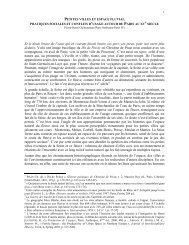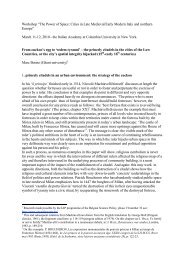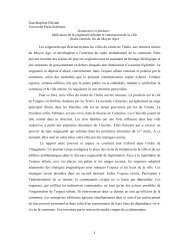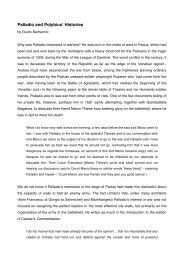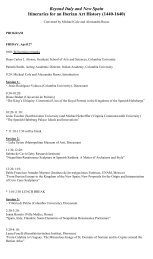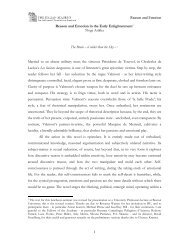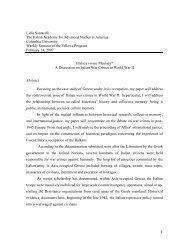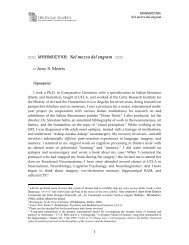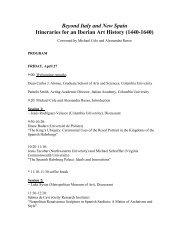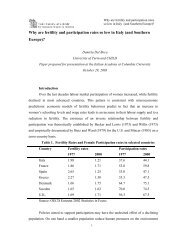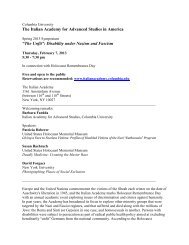The Place of the Tyrant in Machiavelli's Political Thought and the ...
The Place of the Tyrant in Machiavelli's Political Thought and the ...
The Place of the Tyrant in Machiavelli's Political Thought and the ...
You also want an ePaper? Increase the reach of your titles
YUMPU automatically turns print PDFs into web optimized ePapers that Google loves.
<strong>The</strong> <strong>Place</strong> <strong>of</strong> <strong>the</strong> <strong>Tyrant</strong> <strong>in</strong> Machiavelli’s<br />
<strong>Political</strong> <strong>Thought</strong> <strong>and</strong> <strong>the</strong> Literary Genre<br />
<strong>of</strong> <strong>the</strong> Pr<strong>in</strong>ce<br />
Giovanni Giorg<strong>in</strong>i<br />
<strong>The</strong> <strong>Place</strong> <strong>of</strong> <strong>the</strong> <strong>Tyrant</strong> <strong>in</strong> Machiavelli’s <strong>Political</strong> <strong>Thought</strong><br />
<strong>and</strong> <strong>the</strong> Literary Genre <strong>of</strong> <strong>the</strong> Pr<strong>in</strong>ce<br />
<strong>The</strong> Italian Academy for Advanced Studies at Columbia University<br />
Lunch Sem<strong>in</strong>ar, 18 February 2004<br />
1. Introduction<br />
2. Machiavelli’s phenomenology <strong>of</strong> tyranny<br />
3. Machiavelli’s concept <strong>of</strong> tyranny<br />
4. Pr<strong>in</strong>cipality, politics <strong>and</strong> status necessitatis<br />
5. <strong>The</strong> novelty <strong>of</strong> Machiavelli’s teach<strong>in</strong>g <strong>and</strong> <strong>the</strong> literary genre <strong>of</strong> <strong>the</strong> Pr<strong>in</strong>ce
Introduction<br />
My project at <strong>the</strong> Italian Academy concerns how to create good citizens <strong>in</strong> a multicultural<br />
society through a reform <strong>of</strong> education. In my previous paper I tried to show how an<br />
Aristotelian approach seems to be <strong>the</strong> most promis<strong>in</strong>g model <strong>of</strong> education. <strong>The</strong> typical<br />
objection to such an approach is that it “idealizes” too much <strong>the</strong> real situation <strong>of</strong> human<br />
be<strong>in</strong>gs <strong>and</strong> <strong>the</strong>ir ‘nature,’ which has a lot <strong>of</strong> negative features neglected by <strong>the</strong> neo-<br />
Aristotelians. In this paper I aim to show how Machiavelli’s political writ<strong>in</strong>gs aim at<br />
permanently educate <strong>the</strong> real statesman, teach<strong>in</strong>g him <strong>the</strong> primary duty <strong>of</strong> responsibility<br />
<strong>and</strong> <strong>the</strong> virtue <strong>of</strong> prudence. Machiavelli, <strong>the</strong> champion <strong>of</strong> political realism, becomes thus an<br />
ally <strong>of</strong> Aristotle <strong>in</strong> educat<strong>in</strong>g good citizens.<br />
One <strong>of</strong> Machiavelli’s early readers, <strong>the</strong> French author Innocent Gentillet, commented that<br />
Machiavelli devised “des Maximes tous meschantes, et basty sur icelles non une science<br />
politique mais tyrannique.” Interest<strong>in</strong>gly enough, he wrote this sentence <strong>in</strong> a treatise on how<br />
to rule a regime properly <strong>and</strong> peacefully, i.e. ‘politically’, a book known as <strong>the</strong> Anti-<br />
Machiavel. 1 Even more <strong>in</strong>terest<strong>in</strong>g to me is <strong>the</strong> fact that this comment repeats <strong>the</strong> classical<br />
opposition between “politics” <strong>and</strong> “tyranny” that appeared <strong>in</strong> Greek politics <strong>in</strong> <strong>the</strong> VIth<br />
century BCE, when <strong>the</strong> Pisistratid tyrants were chased from <strong>the</strong> city <strong>and</strong> a democratic<br />
government was created, an opposition <strong>the</strong>n bequea<strong>the</strong>d to <strong>the</strong> long tradition <strong>of</strong> Western<br />
political thought. <strong>The</strong> great event <strong>of</strong> 508 BCE marks <strong>the</strong> birth both <strong>of</strong> democracy <strong>and</strong> <strong>of</strong><br />
<strong>the</strong> ideological figure <strong>of</strong> <strong>the</strong> tyrant, who bore only a pale resemblance to <strong>the</strong> actual tyrants<br />
who ruled Greek cities. <strong>The</strong> tyrant <strong>the</strong>n became <strong>the</strong> city’s public enemy <strong>and</strong> tyranny was<br />
viewed as <strong>the</strong> obverse <strong>of</strong> democracy <strong>and</strong> politics itself. 2 <strong>The</strong> vision <strong>of</strong> equal participation to<br />
political rule under <strong>the</strong> law was contrasted with <strong>the</strong> arbitrary <strong>and</strong> sole rulership <strong>of</strong> <strong>the</strong><br />
tyrant, <strong>in</strong> a movement that goes from chaos to order –from <strong>the</strong> whimsical unpredictability<br />
<strong>of</strong> <strong>the</strong> tyrant’s conduct to <strong>the</strong> regularity <strong>of</strong> <strong>the</strong> fixed law. 3 This ideological figure <strong>of</strong> <strong>the</strong><br />
1 “[Machiavelli] devised a number <strong>of</strong> absolutely evil recommendations, <strong>and</strong> built upon those not a political but<br />
a tyrannical science:” Innocent Gentillet, Anti-Machiavel (Discours sur les moyens de bien gouverner et ma<strong>in</strong>tenir en<br />
bonne paix un royaume ou autre pr<strong>in</strong>cipauté...) (1576), ed. A. d’Andrea <strong>and</strong> P.D. Stewart (Florence: Casal<strong>in</strong>i, 1974)<br />
20, emphasis m<strong>in</strong>e.<br />
2 On <strong>the</strong> development <strong>of</strong> <strong>the</strong> tyrant’s ‘ideological figure’ see Giovanni Giorg<strong>in</strong>i, La città e il tiranno. Il concetto di<br />
tirannide nella Grecia del VII-IV secolo (Milan: Giuffré, 1993.) On <strong>the</strong> A<strong>the</strong>nian politico-cultural Stimmung <strong>in</strong> <strong>the</strong><br />
Vth century BCE one may refer to J.F. McGlew, Tyranny <strong>and</strong> <strong>Political</strong> Culture <strong>in</strong> Ancient Greece (Ithaca: Cornell<br />
University Press, 1993) <strong>and</strong> M. Vegetti et al., L’ideologia della città (Naples: Liguori, 1977.)<br />
3 Tyranny <strong>and</strong> law seem to be opposed right from ancient times; noticeably, law-givers <strong>and</strong> jurists never tried<br />
to ‘rationalize’ this form <strong>of</strong> government, i.e. to set it <strong>in</strong>to a juridical frame, <strong>and</strong> tyranny always reta<strong>in</strong>ed this<br />
1
tyrant was described by Greek authors <strong>in</strong> his psychological pr<strong>of</strong>ile as well as <strong>in</strong> his moral,<br />
legal <strong>and</strong> economic features <strong>and</strong>, be<strong>in</strong>g <strong>the</strong> counterpart <strong>of</strong> <strong>the</strong> prevail<strong>in</strong>g view <strong>of</strong> politics,<br />
survived <strong>the</strong> disappearance <strong>of</strong> ancient tyrannies <strong>and</strong> resurfaced <strong>in</strong> different epochs with<br />
some constant traits <strong>and</strong> some features peculiar to <strong>the</strong> historical circumstances. <strong>The</strong><br />
orig<strong>in</strong>al tyranny disappeared, but <strong>the</strong> ‘icon <strong>of</strong> evil’ rema<strong>in</strong>ed.<br />
When Machiavelli put <strong>in</strong> writ<strong>in</strong>g his thoughts on government, he was <strong>the</strong> heir <strong>of</strong><br />
this long-established tradition <strong>of</strong> reflection on tyranny, a tradition that spanned from Solon<br />
to contemporary Florent<strong>in</strong>e civic humanists, pass<strong>in</strong>g through Roman republican authors,<br />
Roman law <strong>and</strong> medieval juridical classifications. Machiavelli’s great novelty was to see<br />
‘politics’ (or republican, popular government) <strong>and</strong> tyranny not as two totally opposed<br />
regimes but ra<strong>the</strong>r as belong<strong>in</strong>g to a cont<strong>in</strong>uum <strong>of</strong> forms <strong>of</strong> government where <strong>the</strong> best<br />
option depended on <strong>the</strong> political circumstances. To be sure, Machiavelli does not obliterate<br />
<strong>the</strong> difference between tyranny <strong>and</strong> k<strong>in</strong>gdom or pr<strong>in</strong>cipality (this will be Hobbes’<br />
contribution); but he sees tyranny as a reformable regime, capable <strong>of</strong> be<strong>in</strong>g turned <strong>in</strong>to a<br />
pr<strong>in</strong>cipality through <strong>the</strong> education <strong>of</strong> <strong>the</strong> ruler. <strong>The</strong> focus <strong>of</strong> both <strong>of</strong> Machiavelli’s most<br />
important political works, <strong>the</strong> Pr<strong>in</strong>ce <strong>and</strong> <strong>the</strong> Discourses, is on <strong>the</strong> permanent education <strong>of</strong> <strong>the</strong><br />
real statesman; for this reason, <strong>the</strong>y both belong to <strong>the</strong> literary genre <strong>of</strong> Aristotle’s Politics<br />
<strong>and</strong> Cicero’s De Inventione, because <strong>the</strong>y aim at creat<strong>in</strong>g a prudent statesman who knows <strong>the</strong><br />
au<strong>the</strong>ntic goal <strong>of</strong> politics but, at <strong>the</strong> same time, is able to recognize “<strong>the</strong> quality <strong>of</strong> times”<br />
<strong>and</strong> face <strong>the</strong> “accidents” <strong>of</strong> political life. Machiavelli’s last<strong>in</strong>g contribution to this classical<br />
tradition rests <strong>in</strong> his dramatic emphasis on <strong>the</strong> “seriousness <strong>of</strong> politics”, that may force a<br />
statesman to “damn his own soul” <strong>in</strong> order to save <strong>the</strong> State (<strong>and</strong> his fellow-citizens.) This<br />
is also <strong>the</strong> permanent lesson he has to teach to contemporary readers, namely how to be a<br />
good citizen <strong>and</strong> a wise statesman so as to be able to counsel well one’s own State <strong>and</strong> even<br />
be able to save it <strong>in</strong> times <strong>of</strong> trouble. Machiavelli’s importance for <strong>the</strong> contemporary reader<br />
does not lie so much <strong>in</strong> <strong>the</strong> republican values he can <strong>in</strong>fuse <strong>in</strong>to liberal <strong>the</strong>ory <strong>and</strong> <strong>in</strong> its<br />
allegedly narrow vision <strong>of</strong> liberty; ra<strong>the</strong>r, it lies <strong>in</strong> his emphasis on <strong>the</strong> all-importance <strong>of</strong><br />
political education for <strong>the</strong> citizens <strong>of</strong> a healthy political community.<br />
feature <strong>of</strong> transiency <strong>and</strong> exceptionality. Medieval political thought, too, seems to be more <strong>in</strong>terested <strong>in</strong> <strong>the</strong><br />
question who <strong>the</strong> tyrant is ra<strong>the</strong>r than what is tyranny.<br />
2
Machiavelli’s phenomenology <strong>of</strong> tyranny<br />
Contrary to our <strong>in</strong>tuitive belief, an <strong>in</strong>vestigation <strong>of</strong> Machiavelli’s notion <strong>of</strong> tyranny<br />
is an engag<strong>in</strong>g task, for this notion appears to be elusive <strong>and</strong> somewhat blurry, as compared<br />
to <strong>the</strong> Florent<strong>in</strong>e secretary’s usual ability to give us astound<strong>in</strong>gly clear-cut def<strong>in</strong>itions. 4 This<br />
does not mean that Machiavelli’s ideas were confused on this topic, but simply that he used<br />
this concept <strong>in</strong> two different ways, descriptively <strong>and</strong> prescriptively, just like <strong>the</strong> classic<br />
Greek authors. In his work, <strong>the</strong> word “tyranny” identifies, on <strong>the</strong> one h<strong>and</strong>, a form <strong>of</strong><br />
monarchical regime <strong>and</strong> has <strong>the</strong>refore a neutral mean<strong>in</strong>g; on <strong>the</strong> o<strong>the</strong>r h<strong>and</strong>, it can have a<br />
clearly negative pathos <strong>and</strong> connotation, which neatly mark its difference from “pr<strong>in</strong>cipality”<br />
<strong>and</strong> o<strong>the</strong>r words used by Machiavelli to describe a one-person government. In this dual<br />
usage Machiavelli, <strong>the</strong> discoverer <strong>of</strong> “new modes <strong>and</strong> orders”, appears to be <strong>the</strong> heir <strong>of</strong><br />
classical Greek political thought, which always showed a remarkable ambivalence towards<br />
tyranny. An <strong>in</strong>vestigation <strong>of</strong> <strong>the</strong> notion <strong>of</strong> tyranny <strong>in</strong> his work thus requires attention to <strong>the</strong><br />
detail without los<strong>in</strong>g sight <strong>of</strong> <strong>the</strong> general picture.<br />
This statement seems, however, to be immediately refuted by <strong>the</strong> very beg<strong>in</strong>n<strong>in</strong>g<br />
sentences <strong>of</strong> Machiavelli’s two major <strong>the</strong>oretical works. At <strong>the</strong> beg<strong>in</strong>n<strong>in</strong>g <strong>of</strong> <strong>the</strong> Pr<strong>in</strong>ce,<br />
where Machiavelli seems to adopt a clear <strong>and</strong> rigorous categorization <strong>of</strong> <strong>the</strong> forms <strong>of</strong><br />
government, he writes:<br />
All <strong>the</strong> states, all <strong>the</strong> dom<strong>in</strong>ions that have held or now hold power over men, have been <strong>and</strong><br />
now are ei<strong>the</strong>r republics or pr<strong>in</strong>cipalities. [...] <strong>The</strong> dom<strong>in</strong>ions ga<strong>in</strong>ed <strong>in</strong> this way are ei<strong>the</strong>r<br />
accustomed to liv<strong>in</strong>g under a pr<strong>in</strong>ce, or used to be<strong>in</strong>g free. 5<br />
Machiavelli seems to reduce <strong>the</strong> elaborate classical <strong>the</strong>ory <strong>of</strong> political regimes –developed <strong>in</strong><br />
<strong>the</strong> age <strong>of</strong> Herodotus, ref<strong>in</strong>ed by Plato, Aristotle <strong>and</strong> Polibius, <strong>and</strong> <strong>the</strong>n passed on to<br />
Roman <strong>and</strong> medieval political thought- to a clear-cut opposition between two regimes,<br />
republic <strong>and</strong> pr<strong>in</strong>cipality, <strong>and</strong> to two correspond<strong>in</strong>g ways <strong>of</strong> liv<strong>in</strong>g, ei<strong>the</strong>r “free” or “under a<br />
pr<strong>in</strong>ce” (a condition that evidently <strong>in</strong>volves some restriction to freedom <strong>and</strong> some form <strong>of</strong><br />
4 This elusiveness leads Mario Turchetti, Tyrannie et tyrannicide de l’Antiquité à nos jours (Paris: PUF, 2001), to say<br />
that Machiavelli does not try to def<strong>in</strong>e tyranny, he simply describes it (351) <strong>and</strong> also to comment “la tyrannie<br />
[...] demeure une tendence” (352).<br />
5 Pr<strong>in</strong>ce 1, emphasis m<strong>in</strong>e. <strong>The</strong> Italian text I use is Il Pr<strong>in</strong>cipe e Discorsi, ed. S. Bertelli, Milan, Feltr<strong>in</strong>elli, 1981.<br />
For <strong>the</strong> English translation I used as a reference Machiavelli. <strong>The</strong> Chief Works <strong>and</strong> O<strong>the</strong>rs, transl. A. Gibbard<br />
(Durham-London: Duke University Press, 3 Vols., 1989); also <strong>The</strong> Discourses <strong>of</strong> N. Machiavelli, ed. L.J. Walker<br />
(London: Routledge & Kegan, 1950), mak<strong>in</strong>g occasional changes. A similar contrast between pr<strong>in</strong>cipality <strong>and</strong><br />
republic, <strong>and</strong> between servitude <strong>and</strong> free life, <strong>in</strong>forms Machiavelli’s account <strong>in</strong> Pr<strong>in</strong>ce 5 <strong>and</strong> <strong>in</strong> Discourses II, 2.<br />
3
servitude.) 6 If we compare this famous beg<strong>in</strong>n<strong>in</strong>g with <strong>the</strong> equally quick categorization <strong>of</strong><br />
chapter 9, dedicated to “civil pr<strong>in</strong>cipality”, we f<strong>in</strong>d three mutually exclusive conditions that<br />
are possible <strong>in</strong> political regimes, namely “ei<strong>the</strong>r pr<strong>in</strong>cipality, or liberty or licence”, 7 where<br />
<strong>the</strong> last alternative equals to anarchy <strong>and</strong> <strong>the</strong>refore to lack <strong>of</strong> political form. More<br />
accurately, “licence” identifies <strong>the</strong> situation exist<strong>in</strong>g <strong>in</strong> a bad regime, usually a popular<br />
government, 8 where <strong>the</strong>re is unsettable strife between <strong>the</strong> noble <strong>and</strong> <strong>the</strong> people: here <strong>the</strong><br />
citizens th<strong>in</strong>k only <strong>of</strong> <strong>the</strong>ir private, selfish <strong>in</strong>terest, <strong>in</strong>stead <strong>of</strong> <strong>the</strong> common good, thus<br />
pav<strong>in</strong>g <strong>the</strong> way to a possible tyranny.<br />
F<strong>in</strong>ally, <strong>in</strong> Discourses I, 2, where he follows closely <strong>the</strong> Polibian vision <strong>of</strong> <strong>the</strong> orig<strong>in</strong>s<br />
<strong>of</strong> political society <strong>and</strong> forms <strong>of</strong> government, Machiavelli states clearly that tyranny results<br />
from <strong>the</strong> decay<strong>in</strong>g <strong>of</strong> pr<strong>in</strong>cipality. More specifically, when <strong>in</strong> ancient times pr<strong>in</strong>cipality<br />
ceased to be elective <strong>and</strong> became hereditary, pr<strong>in</strong>ces began to compete with each o<strong>the</strong>r for<br />
luxuries <strong>and</strong> surrendered to all sorts <strong>of</strong> vices, thus becom<strong>in</strong>g hateful to <strong>the</strong> people, but<br />
above all to <strong>the</strong> aristocrats. Be<strong>in</strong>g aware <strong>of</strong> <strong>the</strong>ir subjects’ hate, <strong>and</strong> fear<strong>in</strong>g conspiracies on<br />
<strong>the</strong> part <strong>of</strong> <strong>the</strong> aristocrats, <strong>the</strong> pr<strong>in</strong>ces started to <strong>of</strong>fend <strong>the</strong> subjects, <strong>and</strong> this perverse<br />
<strong>in</strong>teraction between <strong>the</strong> pr<strong>in</strong>ce <strong>and</strong> “<strong>the</strong> universal” quickly turned pr<strong>in</strong>cipality <strong>in</strong>to tyranny. 9<br />
In <strong>the</strong> general scheme <strong>of</strong> Machiavelli’s thought, however, this appears to be an isolated,<br />
classical rem<strong>in</strong>iscence, which rema<strong>in</strong>s <strong>the</strong>oretically undeveloped.<br />
<strong>The</strong> apparent, unequivocal clarity <strong>of</strong> <strong>the</strong>se quotes might <strong>in</strong>duce us to th<strong>in</strong>k that<br />
tyranny is a species <strong>of</strong> <strong>the</strong> k<strong>in</strong>d “pr<strong>in</strong>cipality”, just like k<strong>in</strong>gdom <strong>and</strong> despotism, although a<br />
degenerate species. We could <strong>the</strong>refore expect to f<strong>in</strong>d <strong>the</strong> classic constrast between “good<br />
k<strong>in</strong>g” <strong>and</strong> “bad tyrant”, elaborated by IVth century Greek political thought; or <strong>the</strong> similarly<br />
classic medieval description <strong>of</strong> tyranny as perversio ord<strong>in</strong>is, brought about ei<strong>the</strong>r by an<br />
arbitrary <strong>and</strong> violent exercise <strong>of</strong> power (ab exercitio) or by lack <strong>of</strong> entitlement to rule (ex<br />
defectu tituli). However, as soon as we delve <strong>in</strong>to Machiavelli’s works, we see that <strong>the</strong> name<br />
“tyrant” is used to describe diverse <strong>and</strong> unexpected figures, not all <strong>of</strong> whom would seem to<br />
fit <strong>in</strong>to <strong>the</strong> usual portrait <strong>of</strong> <strong>the</strong> tyrant accord<strong>in</strong>g to classical <strong>and</strong> medieval authors. On <strong>the</strong><br />
6 On <strong>the</strong> evolution <strong>of</strong> <strong>the</strong> <strong>the</strong>ory <strong>of</strong> political regimes see Nicola Matteucci, “Governo, Forme di” <strong>in</strong><br />
Enciclopedia delle Scienze Sociali (Rome: Istituto dell’Enciclopedia Italiana, 1994), 4: 414-424, who observes that<br />
Machiavelli does not elaborate his conceptualization <strong>of</strong> tyranny.<br />
7 Pr<strong>in</strong>ce 9.<br />
8 Cf. Discourses I, 2 where, follow<strong>in</strong>g closely Polibius’ account, Machiavelli says that “ Popular [government] is<br />
without difficulty converted <strong>in</strong>to licence” <strong>and</strong> <strong>the</strong>n, “<strong>in</strong> order to avoid such licence, pr<strong>in</strong>cipality is once aga<strong>in</strong><br />
restored.”<br />
9 Discourses I, 2. On <strong>the</strong> <strong>in</strong>terpretation <strong>of</strong> this chapter, <strong>and</strong> on Machiavelli’s critical revival <strong>of</strong> Polibius, I agree<br />
with <strong>the</strong> f<strong>in</strong>e analysis <strong>of</strong> Gennaro Sasso, Niccolò Machiavelli (Bologna: Il Mul<strong>in</strong>o, 1993), 1: 481-486.<br />
4
o<strong>the</strong>r h<strong>and</strong>, <strong>the</strong> term is not applied <strong>in</strong> some cases which would seem to dem<strong>and</strong> it. This is<br />
<strong>the</strong> case with some tyrants <strong>of</strong> <strong>the</strong> classical tradition <strong>and</strong> with some figures bear<strong>in</strong>g<br />
obviously ‘tyrannical’ traits: Hiero is described as “<strong>the</strong> pr<strong>in</strong>ce <strong>of</strong> Syracuse,” 10 while<br />
Agatocles is even called both “pr<strong>in</strong>ce” <strong>and</strong> “k<strong>in</strong>g”; 11 Oliverotto from Fermo, <strong>in</strong>cestuous<br />
murderer <strong>of</strong> relatives, receives <strong>the</strong> title <strong>of</strong> “pr<strong>in</strong>ce.” 12 At first sight, <strong>the</strong>n, nei<strong>the</strong>r cruelty nor<br />
lack <strong>of</strong> legitimacy (not to mention moral baseness) seem to be sufficient reasons to be<br />
called a “tyrant” by Machiavelli. And yet, we f<strong>in</strong>d he uses <strong>the</strong> word <strong>in</strong> a derogatory sense<br />
for some statesmen, such as Caesar <strong>and</strong> <strong>the</strong> Roman Church as a whole. We cannot but<br />
conclude that <strong>in</strong> Machiavelli we f<strong>in</strong>d a complex phenomenology <strong>of</strong> monarchic government,<br />
which goes far beyond <strong>the</strong> simple contrast republic/pr<strong>in</strong>cipality or pr<strong>in</strong>cipality/tyranny,<br />
<strong>and</strong> <strong>the</strong> dist<strong>in</strong>ctive features <strong>of</strong> each form <strong>of</strong> monarchic government can be revealed only by<br />
a careful hermeneutical exercise.<br />
One last prelim<strong>in</strong>ary observation, concern<strong>in</strong>g <strong>the</strong> <strong>in</strong>tended readers <strong>of</strong> Machiavelli’s<br />
two major <strong>the</strong>oretical works is here <strong>in</strong> place. In <strong>the</strong> Pr<strong>in</strong>ce Machiavelli never uses <strong>the</strong> word<br />
tyrant, although he depicts many characters as substantially tyrannical <strong>and</strong>, at times, he calls<br />
<strong>the</strong>m tyrants <strong>in</strong> <strong>the</strong> account <strong>of</strong> <strong>the</strong>ir deeds <strong>in</strong> <strong>the</strong> Discourses or <strong>in</strong> o<strong>the</strong>r works.<br />
Notwithst<strong>and</strong><strong>in</strong>g its iconoclastic content, <strong>the</strong> Pr<strong>in</strong>ce, dedicated to Lorenzo de’ Medici, has a<br />
rhetorical form that traces back to <strong>the</strong> tradition <strong>of</strong> <strong>the</strong> specula pr<strong>in</strong>cipis. In it Machiavelli<br />
recurs to <strong>the</strong> rhetorical devices <strong>of</strong> this literary genre <strong>and</strong>, moreover, adopts a prudent<br />
writ<strong>in</strong>g style, suited to <strong>the</strong> people <strong>the</strong>re addressed. This does not mean, <strong>of</strong> course, that<br />
Machiavelli obliterates <strong>the</strong> dist<strong>in</strong>ction between pr<strong>in</strong>cipality, k<strong>in</strong>gdom <strong>and</strong> tyranny <strong>in</strong> <strong>the</strong><br />
Pr<strong>in</strong>ce, but shows us his attentiveness for writ<strong>in</strong>g <strong>and</strong> literary genre: one should better not<br />
use such words as “tyranny” <strong>in</strong> a work dedicated to a pr<strong>in</strong>ce... 13<br />
In order to make our <strong>in</strong>vestigation easier, let us state right form <strong>the</strong> start that<br />
Machiavelli accepts <strong>the</strong> classical vision accord<strong>in</strong>g to which despotism differs from tyranny<br />
<strong>in</strong> that it is a typically oriental occurrence <strong>and</strong>, as such, foreign to European political culture<br />
(<strong>and</strong> practice.) This is a form <strong>of</strong> government characterized by <strong>the</strong> rule <strong>of</strong> a lord who keeps<br />
all subjects alike <strong>in</strong> a condition <strong>of</strong> servitude. 14 To quote <strong>the</strong> very effective account <strong>of</strong> <strong>the</strong><br />
10 Pr<strong>in</strong>ce 6: “Hiero Siracusan [...] from private condition became pr<strong>in</strong>ce <strong>of</strong> Siracusa.”<br />
11 Pr<strong>in</strong>ce 8; cf. Discourses II, 13.<br />
12 Pr<strong>in</strong>ce 8.<br />
13 I owe <strong>the</strong> observation that Machiavelli never uses <strong>the</strong> word “tyrant” <strong>in</strong> <strong>the</strong> Pr<strong>in</strong>ce to Leo Strauss, <strong>Thought</strong>s on<br />
Machiavelli (Chicago-London: University <strong>of</strong> Chicago Press, 1958) 26: “<strong>the</strong> term ‘tyrant’ never occurs <strong>in</strong> <strong>the</strong><br />
Pr<strong>in</strong>ce; ‘tyrant’ is too harsh a word to use with<strong>in</strong> <strong>the</strong> hear<strong>in</strong>g <strong>of</strong> <strong>the</strong> pr<strong>in</strong>ce.”<br />
14 Pr<strong>in</strong>ce 4.<br />
5
Pr<strong>in</strong>ce, <strong>the</strong>re are two different ways to govern a pr<strong>in</strong>cipality: “ei<strong>the</strong>r with one pr<strong>in</strong>ce, <strong>and</strong> all<br />
<strong>the</strong> o<strong>the</strong>rs servants [...]; or with one Pr<strong>in</strong>ce <strong>and</strong> many barons;” “<strong>the</strong> Turk” <strong>and</strong> <strong>the</strong> French<br />
k<strong>in</strong>g, respectively, are <strong>the</strong>ir modern <strong>in</strong>stances. 15 We f<strong>in</strong>d ano<strong>the</strong>r <strong>in</strong>terest<strong>in</strong>g characterization<br />
<strong>of</strong> despotism <strong>in</strong> Discourses II, 2, where Machiavelli speaks <strong>of</strong> <strong>the</strong> oriental pr<strong>in</strong>ces <strong>and</strong> calls<br />
<strong>the</strong>m “barbarians” <strong>and</strong> “destroyers <strong>of</strong> countries <strong>and</strong> dissipators <strong>of</strong> all that man has done for<br />
civilization.” 16 Accord<strong>in</strong>g to a classical stereotype, orig<strong>in</strong>at<strong>in</strong>g <strong>in</strong> <strong>the</strong> Vth century BCE <strong>and</strong><br />
present <strong>in</strong> Herodotus <strong>and</strong> <strong>in</strong> <strong>the</strong> Corpus Hippocraticum, which <strong>the</strong>n became canonical with<br />
Aristotle, <strong>the</strong> servility typical <strong>of</strong> despotism prevents <strong>the</strong> Asians from excell<strong>in</strong>g <strong>in</strong> virtue <strong>and</strong><br />
from accomplish<strong>in</strong>g any great deed. It is for this political reason, which is devoid <strong>of</strong><br />
moralistic judgment, that Machiavelli shows himself un<strong>in</strong>terested <strong>in</strong> <strong>the</strong> despotic form <strong>of</strong><br />
government.<br />
<strong>The</strong> lesson <strong>of</strong> classical political thought on <strong>the</strong> subject <strong>of</strong> monarchical regimes has<br />
an undeniably strong <strong>in</strong>fluence on o<strong>the</strong>r aspects <strong>of</strong> Machiavelli’s thought. Greek political<br />
thought attributed <strong>the</strong> <strong>in</strong>stauration <strong>of</strong> tyrannies <strong>in</strong> <strong>the</strong> cities to stasis, to factional strife<br />
with<strong>in</strong> <strong>the</strong> civic body; such strife was <strong>the</strong>refore considered a deadly disease for <strong>the</strong> political<br />
community. Roman <strong>and</strong> medieval political authors also warned aga<strong>in</strong>st factional strife <strong>and</strong><br />
civil war for <strong>the</strong>ir ability to generate tyranny. Machiavelli takes up this classic conclusion on<br />
<strong>the</strong> dangers <strong>of</strong> factional strife but <strong>in</strong>troduces a fundamental <strong>in</strong>novation, well aware <strong>of</strong> its<br />
novelty. For he sees <strong>in</strong> social conflict (or “tumults”) <strong>the</strong> core <strong>in</strong>gredient <strong>of</strong> Rome’s<br />
greatness <strong>and</strong> liberty. He is persuaded that <strong>the</strong> conflict between patricians <strong>and</strong> plebeians,<br />
correctly <strong>in</strong>stitutionalized by <strong>the</strong> good Roman laws, contributed to <strong>the</strong> well-be<strong>in</strong>g <strong>of</strong> <strong>the</strong><br />
entire city; by allow<strong>in</strong>g <strong>the</strong> Plebs <strong>and</strong> <strong>the</strong> Noble alike to “release <strong>the</strong>ir humors,” <strong>the</strong> good<br />
laws <strong>and</strong> <strong>in</strong>stitutions <strong>of</strong> Rome kept <strong>the</strong> city free <strong>and</strong> enabled her to become great <strong>and</strong><br />
powerful. 17 When, on <strong>the</strong> o<strong>the</strong>r h<strong>and</strong>, <strong>the</strong>re are no good laws or <strong>in</strong>stitutions, social conflict<br />
is like a deadly disease for <strong>the</strong> political community, because it leads to <strong>the</strong> pursuit <strong>of</strong> selfish<br />
ends, <strong>the</strong> loss <strong>of</strong> liberty <strong>and</strong>, eventually, tyranny:<br />
In <strong>the</strong> <strong>in</strong>cidents here related it should, <strong>the</strong>refore, be noticed first <strong>of</strong> all that <strong>the</strong> <strong>in</strong>convenience<br />
<strong>in</strong>volved <strong>in</strong> <strong>the</strong> establishment <strong>of</strong> this tyranny was due to <strong>the</strong> same causes as are most that are<br />
set up <strong>in</strong> cities, namely to <strong>the</strong> excessive dem<strong>and</strong> <strong>of</strong> <strong>the</strong> people for freedom <strong>and</strong> to <strong>the</strong> excessive<br />
dem<strong>and</strong> to dom<strong>in</strong>ate on <strong>the</strong> part <strong>of</strong> <strong>the</strong> nobles. For, when <strong>the</strong>y fail to agree <strong>in</strong> mak<strong>in</strong>g a law<br />
15 Pr<strong>in</strong>ce 19; Discourses III, 1.<br />
16 Discourses II, 2.<br />
17 See especially Discourses I, 4.<br />
6
conducive to liberty, <strong>and</strong>, <strong>in</strong>stead, one or o<strong>the</strong>r <strong>of</strong> <strong>the</strong> parties uses its weight to support one<br />
particular person, tyranny at once arises. 18<br />
What is manifest here is <strong>the</strong> contrast between <strong>the</strong> liberty guaranteed to everybody by <strong>the</strong><br />
law, <strong>and</strong> <strong>the</strong> arbitrary power <strong>of</strong> one person under a tyrant. Machiavelli’s notion <strong>of</strong> tyranny<br />
is part <strong>and</strong> parcel <strong>of</strong> his complex, essentially naturalistic, 19 conception <strong>of</strong> <strong>the</strong> <strong>in</strong>ner dynamics<br />
<strong>of</strong> political regimes. Machiavelli is persuaded that <strong>in</strong> all political communities <strong>the</strong> “humors”<br />
<strong>of</strong> <strong>the</strong> people <strong>and</strong> <strong>of</strong> <strong>the</strong> nobles must conflict: <strong>the</strong> ambition <strong>of</strong> <strong>the</strong> nobles is to dom<strong>in</strong>ate;<br />
<strong>the</strong> people, on <strong>the</strong> o<strong>the</strong>r h<strong>and</strong>, just want to be free. 20 Where <strong>the</strong>se “humors” are channelled<br />
by good laws <strong>and</strong> <strong>in</strong>stitutions, toge<strong>the</strong>r with good customs <strong>and</strong> good luck, <strong>the</strong> State<br />
flourishes; 21 o<strong>the</strong>rwise, social conflict paves <strong>the</strong> way to tyranny, which is <strong>the</strong>refore <strong>the</strong><br />
negative outcome <strong>of</strong> factional strife. In this situations, what <strong>of</strong>ten happens is that a citizen<br />
comes to such great fame that he aspires to go beyond republican equality. With presents<br />
<strong>and</strong> munificence, or by w<strong>in</strong>n<strong>in</strong>g <strong>the</strong> favour <strong>of</strong> his soldiers, he creates a follow<strong>in</strong>g for<br />
himself, bl<strong>in</strong>ds <strong>the</strong> people with “some k<strong>in</strong>d <strong>of</strong> false good” <strong>and</strong> becomes <strong>the</strong> tyrant <strong>of</strong> <strong>the</strong><br />
city. 22<br />
Follow<strong>in</strong>g literally an Herodotean suggestion, Machiavelli considers freedom<br />
conducive to power, <strong>in</strong>deed, <strong>the</strong> basic <strong>in</strong>gredient <strong>of</strong> success <strong>and</strong> flourish<strong>in</strong>g for a political<br />
community. Only free peoples can accomplish “great deeds”; free peoples flourish because<br />
<strong>the</strong>y do not pursue <strong>the</strong>ir private <strong>in</strong>terest but <strong>the</strong> common good. Aga<strong>in</strong>, echo<strong>in</strong>g Sallust, he<br />
ma<strong>in</strong>ta<strong>in</strong>s that it is only <strong>the</strong> common good that makes cities great <strong>and</strong> “this is pursued only<br />
<strong>in</strong> republics.” 23 <strong>The</strong> political arena is for Machiavelli <strong>the</strong> stage where “great deeds” are<br />
accomplished <strong>and</strong> <strong>the</strong> tyrant –as Aristotle had already ma<strong>in</strong>ta<strong>in</strong>ed by describ<strong>in</strong>g tyranny as<br />
<strong>the</strong> “far<strong>the</strong>st removed from a form <strong>of</strong> government,” because it is aga<strong>in</strong>st men’s natural <strong>and</strong><br />
political ends- prevents citizens from accomplish<strong>in</strong>g anyth<strong>in</strong>g great. 24 <strong>The</strong>se classical<br />
suggestions, toge<strong>the</strong>r with contemporary republican arguments, led Machiavelli to espouse<br />
18 Discourses I, 40, emphasis m<strong>in</strong>e.<br />
19 Discourses I, 6. Similar statements <strong>in</strong> Discourses II, Proem; III, 1; Florent<strong>in</strong>e Histories V, 1.<br />
20 Pr<strong>in</strong>ce 9; Discourses I, 5.<br />
21 Discourses I, 48.<br />
22 Discourses III, 28. See also Machiavelli’s reservations towards <strong>the</strong> extremely human behaviour displayed by<br />
Valerius Corv<strong>in</strong>us toward his soldiers: this behaviour is “advantageous <strong>in</strong> <strong>the</strong> case <strong>of</strong> a pr<strong>in</strong>ce but harmful <strong>in</strong><br />
<strong>the</strong> case <strong>of</strong> a private citizen,” because it “prepares <strong>the</strong> way for tyranny:” Discourses III, 22. I cannot agree,<br />
<strong>the</strong>refore, with Gennaro Sasso, who th<strong>in</strong>ks that <strong>the</strong> tyrant <strong>in</strong> Machiavelli is identified by a double enmity,<br />
towards <strong>the</strong> people as well as towards <strong>the</strong> magistrates <strong>and</strong> <strong>the</strong> noble. As a consequence, <strong>the</strong> tyrant’s power<br />
lacks a specific social support <strong>and</strong> is necessarily weak. See Gennaro Sasso, “Pr<strong>in</strong>cipato civile e tirannide” <strong>in</strong><br />
Machiavelli e gli antichi e altri saggi (Milan-Naples: Ricciardi, 1988), 2: 386.<br />
23 Discourses II, 2. Cf. I, 1. For <strong>the</strong> classical examples see Herodotus V, 66; V, 78; V, 91; Sallust VII, 3.<br />
24 Aristotle, Politics V 11, 1313a34-1314a25.<br />
7
<strong>the</strong> superiority <strong>of</strong> republican “vivere libero” as compared to tyranny: even if a “virtuous<br />
tyrant” arose <strong>in</strong> a community, he comments, <strong>the</strong>re would follow no advantage to <strong>the</strong><br />
people because every <strong>in</strong>crease <strong>in</strong> <strong>the</strong> State would be to <strong>the</strong> advantage <strong>of</strong> <strong>the</strong> tyrant, who<br />
cannot even recognize <strong>the</strong> merit <strong>of</strong> valuable citizens. Us<strong>in</strong>g arguments that seem drawn<br />
from Aristotle’s Politics or from Xenophon’s Hiero (as well as Plato’s Republic), Machiavelli<br />
concludes his portrait <strong>of</strong> <strong>the</strong> tyrant by say<strong>in</strong>g that <strong>the</strong> tyrant cannot bestow honours on<br />
good citizens, is surrounded by flatterers, lives <strong>in</strong> cont<strong>in</strong>uous suspicion <strong>and</strong> turns “what is<br />
public” <strong>in</strong>to a private possession. 25 We are at this po<strong>in</strong>t puzzled. What is <strong>the</strong> difference, we<br />
may ask, between <strong>the</strong> person who takes advantage <strong>of</strong> factional strife <strong>in</strong> order to become a<br />
tyrant <strong>and</strong> <strong>the</strong> “prudent man” who assumes power <strong>in</strong> order to become pr<strong>in</strong>ce <strong>and</strong> restore<br />
order <strong>in</strong> a corrupt city?<br />
Machiavelli’s concept <strong>of</strong> tyranny<br />
Let us now face <strong>the</strong> difficult problem <strong>of</strong> identify<strong>in</strong>g Machiavelli’s concept <strong>of</strong><br />
tyranny from a dual perspective, <strong>the</strong> one vaguely deductive, <strong>the</strong> o<strong>the</strong>r more specifically<br />
<strong>in</strong>ductive. Let us consider, on <strong>the</strong> one h<strong>and</strong>, <strong>in</strong> what Machiavelli’s vision <strong>of</strong> good<br />
government <strong>and</strong> <strong>of</strong> <strong>the</strong> best regime consists, <strong>in</strong> order to see if this enables us to identify per<br />
contrarium his concept <strong>of</strong> tyranny; let us exam<strong>in</strong>e, on <strong>the</strong> o<strong>the</strong>r h<strong>and</strong>, some <strong>in</strong>stances <strong>of</strong><br />
people described as “tyrants” by Machiavelli, <strong>in</strong> order to elicit <strong>the</strong> features that make <strong>the</strong>m<br />
tyrants.<br />
What is, <strong>the</strong>n, <strong>the</strong> positive counterpart <strong>of</strong> tyranny <strong>in</strong> Machiavelli, what is his notion<br />
<strong>of</strong> good government? This is a mixed government, where laws <strong>and</strong> <strong>in</strong>stitutions prompt<br />
citizens to display <strong>the</strong> greatest “virtue” <strong>in</strong> <strong>in</strong>ner politics. <strong>The</strong> “vivere libero” is characterized<br />
by <strong>the</strong> participation <strong>of</strong> all citizens <strong>in</strong> <strong>the</strong> formation <strong>of</strong> <strong>the</strong> law that regulates <strong>the</strong> political<br />
community: liberty is equated with self-government. This is obviously an ideal, one that can<br />
none<strong>the</strong>less be approximated <strong>in</strong> reality by aim<strong>in</strong>g at <strong>the</strong> participation <strong>of</strong> most or an<br />
<strong>in</strong>creas<strong>in</strong>g number <strong>of</strong> citizens <strong>in</strong> <strong>the</strong> formation <strong>of</strong> law. Machiavelli is a realist <strong>and</strong> his<br />
observation <strong>of</strong> <strong>the</strong> ways <strong>of</strong> <strong>the</strong> world taught him that only a small segment <strong>of</strong> <strong>the</strong> people<br />
“desires to be free <strong>in</strong> order to rule, while all <strong>the</strong> o<strong>the</strong>rs, who are countless, desire freedom<br />
25 Discourses II, 2. For this reason <strong>in</strong> Pr<strong>in</strong>ce 23 Machiavelli recommends that <strong>the</strong> pr<strong>in</strong>ce avoid flatterers <strong>and</strong><br />
resort <strong>in</strong>stead to a few faithful men for counsell<strong>in</strong>g, men who may tell him <strong>the</strong> truth on any question. For <strong>the</strong><br />
classical examples see Xenophon, Hiero II, 10-11; V, 1; VII, 8. Plato, Republic book IX. Aristotle, Politics V 10,<br />
1310a40-1311a27.<br />
8
to live <strong>in</strong> security.” 26 In any case, “vivere civile” <strong>and</strong> “vivere libero” are possible only <strong>in</strong> a<br />
community based on <strong>the</strong> rule <strong>of</strong> law <strong>and</strong> aimed at <strong>the</strong> common good. Follow<strong>in</strong>g <strong>in</strong> <strong>the</strong><br />
republican tradition, this k<strong>in</strong>d <strong>of</strong> community is called “republic” <strong>and</strong> identified with a<br />
regime generally speak<strong>in</strong>g different from monarchy. 27 Fur<strong>the</strong>rmore, like Cicero <strong>and</strong> classical<br />
republican authors, Machiavelli sees “vivere civile” as based on equality before <strong>the</strong> laws<br />
(aequum ius) <strong>and</strong> on equal access to magistracies accord<strong>in</strong>g to virtue (aequa libertas). 28 An<br />
essential feature <strong>of</strong> civil <strong>and</strong> political life is for him <strong>the</strong> rule <strong>of</strong> law, centered on <strong>the</strong> generality<br />
<strong>and</strong> impartiality <strong>of</strong> <strong>the</strong> law. As it is well shown by Horatius’ example <strong>in</strong> Discourses I, 24, <strong>in</strong> a<br />
well-ordered government laws apply equally to everyone, without considerations <strong>of</strong> social<br />
status; prizes <strong>and</strong> punishments are determ<strong>in</strong>ed by <strong>the</strong> laws, which embody <strong>the</strong> deliberation<br />
<strong>of</strong> <strong>the</strong> political community, <strong>and</strong> not by <strong>the</strong> whimsical will <strong>of</strong> one person.<br />
Tyranny is <strong>the</strong> complete obverse <strong>of</strong> all this: it is <strong>the</strong> denial <strong>of</strong> liberty <strong>and</strong> <strong>the</strong> rule <strong>of</strong><br />
law. Machiavelli explicitly contrasts “civil <strong>and</strong> free liv<strong>in</strong>g” with “absolute <strong>and</strong> tyrannical<br />
liv<strong>in</strong>g.” 29 More specifically, <strong>the</strong> danger lies <strong>in</strong> <strong>the</strong> situation when someone “assumes<br />
extraord<strong>in</strong>ary authority <strong>and</strong> <strong>in</strong>troduces laws disruptive <strong>of</strong> civic equality.” 30 This easily leads<br />
to a condition that is <strong>the</strong> opposite <strong>of</strong> <strong>the</strong> “vivere libero” regulated by laws, where <strong>the</strong><br />
tyrant’s whim is itself <strong>the</strong> law. 31 Tyranny is based on armed violence –which is <strong>the</strong> contrary<br />
to “civil modes <strong>and</strong> customs”- <strong>and</strong> on <strong>the</strong> necessity to <strong>in</strong>troduce all sorts <strong>of</strong> <strong>in</strong>novations <strong>in</strong><br />
<strong>the</strong> State <strong>in</strong> order to subdue <strong>the</strong> old powers <strong>and</strong> shatter ancient loyalties. “Such methods,”<br />
Machiavelli notes, “are exceed<strong>in</strong>gly cruel <strong>and</strong> are repugnant to any community, not only to<br />
a Christian one, but to any composed <strong>of</strong> men. It behoves, <strong>the</strong>refore, every man to shun<br />
<strong>the</strong>m, <strong>and</strong> to prefer ra<strong>the</strong>r to live as a private citizen than as a k<strong>in</strong>g with such ru<strong>in</strong>ation <strong>of</strong><br />
men to his score.” 32 Tyranny orig<strong>in</strong>ates from corruption, from sedition <strong>and</strong> disorder <strong>and</strong> is<br />
26 Discourses I, 16. Although <strong>the</strong> idea that <strong>the</strong> many are not so much annoyed at be<strong>in</strong>g excluded from hold<strong>in</strong>g<br />
<strong>of</strong>fice, because <strong>the</strong>y are glad to m<strong>in</strong>d <strong>the</strong>ir own affairs, comes from Aristotle, Politics V 8, 1308b34-37. This<br />
passage, extremely realistic <strong>in</strong> identify<strong>in</strong>g <strong>in</strong> few citizens those who really desire freedom <strong>in</strong> order to<br />
participate <strong>in</strong> political power, makes more complex <strong>the</strong> republican image <strong>of</strong> Machiavelli depicted, for<br />
<strong>in</strong>stance, by Quent<strong>in</strong> Sk<strong>in</strong>ner. See Quent<strong>in</strong> Sk<strong>in</strong>ner, Liberty before Liberalism (Cambridge: Cambridge University<br />
Press, 1997.)<br />
27 For an excellent summary see Quent<strong>in</strong> Sk<strong>in</strong>ner, “<strong>The</strong> Republican Ideal <strong>of</strong> <strong>Political</strong> Liberty” <strong>in</strong> Liberty before<br />
Liberalism.<br />
28 Cicero, De Officiis I, 34, 124; Livy II, 3. For this ‘republican’ characterization <strong>of</strong> Machiavelli see Maurizio<br />
Viroli, Machiavelli (Oxford: Oxford University Press, 1998.)<br />
29 Discourses I, 9. See also Discourses III, 3, <strong>and</strong> III, 7, on <strong>the</strong> “changes from freedom to tyranny or <strong>the</strong> o<strong>the</strong>r<br />
way about.”<br />
30 Discourses III, 3.<br />
31 Discourses I, 25-26. Cf. Florent<strong>in</strong>e Histories VIII, 1 where “vivere civile” is contrasted with “sole authority.”<br />
32 Discourses I, 26.<br />
9
nourished by <strong>the</strong>m, be<strong>in</strong>g <strong>the</strong>refore <strong>the</strong> perfect obverse to “vivere politico; 33 this, <strong>in</strong> turn, is<br />
identified by “<strong>the</strong> possibility <strong>of</strong> enjoy<strong>in</strong>g what one has, freely <strong>and</strong> without <strong>in</strong>curr<strong>in</strong>g<br />
suspicion for <strong>in</strong>stance, <strong>the</strong> assurance that one’s wife <strong>and</strong> children will be respected, <strong>the</strong><br />
absence <strong>of</strong> fear for oneself.” 34 <strong>The</strong> contrast could not be more hard <strong>and</strong> fast. Liberty<br />
essentially consists <strong>in</strong> liv<strong>in</strong>g safely <strong>in</strong> a condition <strong>of</strong> equality; 35 tyranny, on <strong>the</strong> contrary,<br />
stems from <strong>in</strong>equality that leads to factional strife unregulated by <strong>the</strong> laws. 36 <strong>Political</strong> art<br />
consists <strong>in</strong> unify<strong>in</strong>g, or keep<strong>in</strong>g toge<strong>the</strong>r, a State <strong>and</strong> <strong>in</strong> giv<strong>in</strong>g common laws to it; <strong>the</strong> tyrant<br />
keeps “<strong>the</strong> state disjo<strong>in</strong>ed” <strong>and</strong> only th<strong>in</strong>ks <strong>of</strong> his own private <strong>in</strong>terest. 37<br />
Now, let us exam<strong>in</strong>e some <strong>in</strong>stances <strong>of</strong> tyrants described by Machiavelli, recall<strong>in</strong>g<br />
that he never uses <strong>the</strong> word <strong>in</strong> <strong>the</strong> Pr<strong>in</strong>ce. As we have previously noted, we f<strong>in</strong>d <strong>in</strong> his work<br />
a neutral usage <strong>of</strong> <strong>the</strong> word “tyrant”, where it means simply “monarch”: <strong>the</strong> Spartan Nabis,<br />
for <strong>in</strong>stance, is <strong>in</strong>terchangeably called “pr<strong>in</strong>ce” (Pr<strong>in</strong>ce 9) <strong>and</strong> “tyrant” (Discourses I, 40 <strong>and</strong><br />
III, 6.) 38 This “weak” use is less <strong>in</strong>terest<strong>in</strong>g for our purposes. It is to <strong>the</strong> pregnant use <strong>of</strong> <strong>the</strong><br />
word that we must look for <strong>the</strong>oretical clarification. <strong>The</strong> presence <strong>of</strong> <strong>the</strong> A<strong>the</strong>nian tyrant<br />
Pisistratus among his examples <strong>of</strong> tyrants should not surprise us; what is <strong>in</strong>terest<strong>in</strong>g,<br />
however, is <strong>the</strong> reason. Pisistratus took away <strong>the</strong> freedom <strong>in</strong> which A<strong>the</strong>ns had previously<br />
lived thanks to Solon’s reforms, <strong>and</strong> this is why Machiavelli br<strong>and</strong>s him a “tyrant.” 39 <strong>The</strong><br />
situation <strong>of</strong> Clearcus is identical. He became ruler <strong>of</strong> Eraclea by tak<strong>in</strong>g advantage <strong>of</strong><br />
factional strife, <strong>and</strong> <strong>the</strong>n stripped <strong>the</strong> people <strong>of</strong> its freedom. 40 A similar case is that <strong>of</strong><br />
Tarqu<strong>in</strong> “<strong>the</strong> Proud.” He acquired “extraord<strong>in</strong>ary” power <strong>and</strong> ruled like a tyrant from his<br />
palace, keep<strong>in</strong>g public debate out <strong>of</strong> politics <strong>and</strong> relegat<strong>in</strong>g it to a private affaire, trampl<strong>in</strong>g<br />
on <strong>the</strong> laws <strong>and</strong> on <strong>the</strong> senate’s power. Caesar was Rome’s first tyrant because he acquired<br />
an “extraord<strong>in</strong>ary authority” that destroyed <strong>the</strong> republican freedom. Caesar is guilty <strong>of</strong><br />
putt<strong>in</strong>g himself beyond <strong>the</strong> law, just like <strong>the</strong> decemvirs, who are also labelled as tyrants for<br />
“occupy<strong>in</strong>g Rome’s liberty.” 41 We may <strong>in</strong>fer that rul<strong>in</strong>g aga<strong>in</strong>st <strong>the</strong> ancient laws, modes <strong>and</strong><br />
customs, thus destroy<strong>in</strong>g <strong>the</strong> liberty <strong>of</strong> <strong>the</strong> citizens, transforms <strong>the</strong> pr<strong>in</strong>ce <strong>in</strong>to a tyrant <strong>and</strong><br />
33 Discourses III, 8.<br />
34 Discourses I, 16. <strong>The</strong> whole chapter focusses on <strong>the</strong> difference between “tyrannical state” <strong>and</strong> “vivere<br />
libero.”<br />
35 Discourses I, 16; I, 17.<br />
36 Discourses I, 40; III, 28.<br />
37 Discourses II, 2.<br />
38 See also <strong>the</strong> cases <strong>of</strong> Annon <strong>of</strong> Carthago <strong>and</strong> <strong>of</strong> P<strong>and</strong>olfo Petrucci <strong>of</strong> Siena <strong>in</strong> Discourses III, 6, where<br />
“pr<strong>in</strong>ce” <strong>and</strong> “tyrant” are used <strong>in</strong>differently. P<strong>and</strong>olfo Petrucci is described as “pr<strong>in</strong>ce <strong>of</strong> Siena” <strong>in</strong> Pr<strong>in</strong>ce 20.<br />
39 Discourses I, 28. Cf. II, 2; III, 6.<br />
40 Discourses I, 16.<br />
41 Discourses I, 35; I, 40; I, 41.<br />
10
endangers <strong>the</strong> State itself. This is <strong>the</strong> outright political guilt <strong>of</strong> <strong>the</strong> tyrants, not <strong>the</strong> fact that<br />
<strong>the</strong>y obta<strong>in</strong>ed <strong>the</strong>ir power <strong>in</strong> an “extraord<strong>in</strong>ary <strong>and</strong> hateful way.” 42<br />
<strong>The</strong>re is one passage <strong>in</strong> which Machiavelli’s republican pathos prompts him to say<br />
that changes <strong>in</strong> political regimes happen only “from republic <strong>in</strong>to tyranny or from tyranny<br />
<strong>in</strong>to republic” <strong>and</strong> <strong>the</strong>re is no mention <strong>of</strong> pr<strong>in</strong>cipality nor <strong>of</strong> any o<strong>the</strong>r regime. 43 We may<br />
recall that <strong>in</strong> Machiavelli’s works <strong>the</strong> “istraord<strong>in</strong>ari” are means outside <strong>the</strong> law, l<strong>in</strong>ked to an<br />
exceptional situation <strong>and</strong> lethal to republican equality. 44 Accord<strong>in</strong>gly, Machiavelli praises <strong>the</strong><br />
Roman <strong>in</strong>stitution <strong>of</strong> dictatorship because, though it is an exceptional form <strong>of</strong> power, it is<br />
regulated by <strong>the</strong> laws. 45 Similarly, Oliverotto from Fermo is not called a tyrant because he<br />
killed his uncle <strong>in</strong> order to reach <strong>the</strong> throne, but because he turned a city whose citizens<br />
used to live free <strong>in</strong>to a pr<strong>in</strong>cipality, <strong>and</strong>, <strong>in</strong> <strong>the</strong> end, was not even able to keep his power. 46<br />
Machiavelli comments that <strong>the</strong> people <strong>of</strong> Fermo who helped him ga<strong>in</strong> his power<br />
“cherished servitude more than <strong>the</strong> freedom <strong>of</strong> <strong>the</strong>ir country.” 47 On <strong>the</strong> o<strong>the</strong>r h<strong>and</strong>,<br />
Romulus, who kills his bro<strong>the</strong>r Remus <strong>in</strong> <strong>the</strong> very act <strong>of</strong> found<strong>in</strong>g Rome, is not called a<br />
tyrant. Machiavelli comments that “it is convenient to conclude that, although <strong>the</strong> fact is<br />
aga<strong>in</strong>st him, <strong>the</strong> effect justifies him.” 48 For Romulus acted to defend <strong>the</strong> “common good”<br />
<strong>and</strong> not “out <strong>of</strong> his own ambition.” After found<strong>in</strong>g Rome, he did not set up an ephemeral<br />
personal rulership but kept for himself only <strong>the</strong> k<strong>in</strong>d <strong>of</strong> authority typical <strong>of</strong> a good k<strong>in</strong>g,<br />
lead<strong>in</strong>g <strong>the</strong> army <strong>and</strong> convok<strong>in</strong>g <strong>the</strong> Senate, <strong>and</strong> thus started “uno vivere civile e libero.”<br />
In <strong>the</strong> case <strong>of</strong> Giovampagolo Baglioni <strong>of</strong> Perugia, Machiavelli’s negative judgment<br />
is motivated by Giovampagolo’s <strong>in</strong>capacity to be completely evil, with <strong>the</strong> consequence<br />
that he lost his power. Giovampagolo, who had killed cous<strong>in</strong>s <strong>and</strong> nephews <strong>in</strong> order to<br />
grab <strong>the</strong> power, <strong>and</strong> who had an <strong>in</strong>cestuous relationship with his sister, did not dare oppose<br />
Pope Giulio II because <strong>of</strong> his cowardice. 49 In his case, moral sordidness becomes political<br />
<strong>in</strong>effectiveness, <strong>and</strong> this prompts Machiavelli’s reproach.<br />
42 Discourses III, 5.<br />
43 Discourses III, 3, where we also f<strong>in</strong>d a contrast between tyranny <strong>and</strong> “free state.”<br />
44 I am persuaded that <strong>the</strong> “istraord<strong>in</strong>ari” refer to <strong>the</strong> political <strong>and</strong> legal realm, <strong>and</strong> not to <strong>the</strong> sphere <strong>of</strong><br />
morality, as Quent<strong>in</strong> Sk<strong>in</strong>ner seems to believe: see his “<strong>The</strong> Idea <strong>of</strong> Negative Liberty: Philosophical <strong>and</strong><br />
Historical Perspectives” <strong>in</strong> Philosophy <strong>in</strong> History, ed. R. Rorty, J.B. Schneew<strong>in</strong>d <strong>and</strong> Q. Sk<strong>in</strong>ner (Cambridge:<br />
Cambridge University Press, 1984) 193-221, cf. 205 n. 25.<br />
45 Discourses I, 34; cf. I, 29; I, 34. On Caesar as <strong>the</strong> first tyrant <strong>of</strong> Rome see Discourses I, 37.<br />
46 Similar also is <strong>the</strong> case <strong>of</strong> Francesco Valori <strong>in</strong> Florence: he lives like a pr<strong>in</strong>ce <strong>in</strong> <strong>the</strong> city <strong>and</strong> is presumed to<br />
be able to set up his personal rule, go<strong>in</strong>g beyond <strong>the</strong> “vivere civile.” In order to contrast him <strong>the</strong> Florent<strong>in</strong>es<br />
had to recur to “extraord<strong>in</strong>ary ways.”<br />
47 Pr<strong>in</strong>ce 8.<br />
48 Discourses I, 9.<br />
49 Discourses I, 27.<br />
11
This is exemplified on a bigger scale by Machiavelli’s treatment <strong>of</strong> <strong>the</strong> Roman<br />
Church, which also shows his bold, <strong>in</strong>dependent capacity <strong>of</strong> judgment. <strong>The</strong> “nepharious<br />
examples” <strong>of</strong> <strong>the</strong> Church led Italy to lose “all devotion <strong>and</strong> all religion; which causes<br />
<strong>in</strong>numerable <strong>in</strong>conveniences <strong>and</strong> <strong>in</strong>numerable disorders” because, as Machiavelli has<br />
previously shown, where <strong>the</strong>re is no religion only fear <strong>of</strong> <strong>the</strong> pr<strong>in</strong>ce can save <strong>the</strong> State. 50<br />
But <strong>the</strong> Church is even more <strong>the</strong> cause <strong>of</strong> our ru<strong>in</strong> for a political reason: it kept, <strong>and</strong><br />
cont<strong>in</strong>ues to keep, Italy divided, thus prevent<strong>in</strong>g <strong>the</strong> Italians from enjoy<strong>in</strong>g <strong>the</strong> advantages<br />
<strong>of</strong> <strong>the</strong> “vivere civile”: “Now <strong>of</strong> a truth no country has ever been united <strong>and</strong> happy unless<br />
<strong>the</strong> whole <strong>of</strong> it has been under <strong>the</strong> jurisdiction <strong>of</strong> one republic or one pr<strong>in</strong>ce, as has<br />
happened to France <strong>and</strong> Spa<strong>in</strong>” –Machiavelli concludes. 51 It is for such political reasons<br />
that Machiavelli goes on to say that <strong>the</strong> Roman Church is <strong>the</strong> tyrant <strong>of</strong> Italy.<br />
Ano<strong>the</strong>r case is that <strong>of</strong> Gualtieri <strong>of</strong> Brienne, <strong>the</strong> Duke <strong>of</strong> A<strong>the</strong>ns. Machiavelli<br />
describes his pompous manner, <strong>the</strong> cont<strong>in</strong>uous presence <strong>of</strong> armed cronies at his side, his<br />
violence aga<strong>in</strong>st women <strong>and</strong> his arbitrar<strong>in</strong>ess towards o<strong>the</strong>r citizens, aga<strong>in</strong>st all laws. Under<br />
his “tyrannical modes”<br />
<strong>the</strong> citizens lived full <strong>of</strong> <strong>in</strong>dignation, see<strong>in</strong>g <strong>the</strong> majesty <strong>of</strong> <strong>the</strong> State ru<strong>in</strong>ed, <strong>the</strong> orders<br />
corrupted, <strong>the</strong> laws cancelled, all honourable liv<strong>in</strong>g rotten, all civil modesty destroyed. 52<br />
Tyranny determ<strong>in</strong>es not only <strong>the</strong> end <strong>of</strong> genu<strong>in</strong>e political life (<strong>the</strong> Duke had “bound <strong>the</strong><br />
h<strong>and</strong>s <strong>and</strong> gagged <strong>the</strong> mouth” <strong>of</strong> <strong>the</strong> city, Machiavelli observes), but also <strong>the</strong> corruption <strong>of</strong><br />
morality. No moral life is possible where <strong>the</strong>re are no good <strong>in</strong>stitutions <strong>and</strong> laws valid for<br />
everyone, briefly were <strong>the</strong>re is not <strong>the</strong> “majesty <strong>of</strong> <strong>the</strong> State.”<br />
We can now more clearly underst<strong>and</strong> why Machiavelli does not use <strong>the</strong> term<br />
“tyrant” nor passes a negative judgment on some classical tyrants or on some morally<br />
debatable people –namely, for <strong>the</strong>ir political merits <strong>in</strong> found<strong>in</strong>g or keep<strong>in</strong>g <strong>in</strong> existence a<br />
political community. Such merits are obviously judged accord<strong>in</strong>g to Machiavelli’s st<strong>and</strong>ards<br />
<strong>of</strong> good political life <strong>and</strong> statemanship, which <strong>in</strong>clude <strong>the</strong> ability <strong>of</strong> unify<strong>in</strong>g, or keep<strong>in</strong>g<br />
toge<strong>the</strong>r, <strong>the</strong> State, gett<strong>in</strong>g rid <strong>of</strong> factions <strong>and</strong> contrast<strong>in</strong>g external enemies, rely<strong>in</strong>g only on<br />
civic, non mercenary, army; all this toge<strong>the</strong>r with <strong>the</strong> desire to do “great th<strong>in</strong>gs”, to<br />
aggr<strong>and</strong>ize <strong>the</strong> State <strong>and</strong> acquire personal glory. Hiero <strong>of</strong> Syracuse is an example <strong>of</strong> a good<br />
pr<strong>in</strong>ce because he had virtue also <strong>in</strong> private matters <strong>and</strong> took <strong>the</strong> necessary actions to keep<br />
50 Discourses I, 11.<br />
51 Discourses I, 12.<br />
52 Florent<strong>in</strong>e Histories II, 36.<br />
12
his power once he got it, <strong>in</strong>clud<strong>in</strong>g not rely<strong>in</strong>g on mercenary army. 53 Similarly, Agatocles <strong>of</strong><br />
Syracuse is praised because he acquired his power thanks to his own merits <strong>and</strong> without<br />
rely<strong>in</strong>g on fortune, <strong>and</strong> kept <strong>the</strong> city free from <strong>in</strong>ner conflicts, rul<strong>in</strong>g it “without any civil<br />
controversy.” He was able to use well cruelty, although so conspicuously as to lead<br />
Machiavelli to comment that his qualities enabled him to “acquire power but not glory.” 54<br />
<strong>The</strong> same applies to Cesare Borgia, who found Romagna <strong>in</strong> disunion <strong>and</strong> full <strong>of</strong> <strong>the</strong>fts <strong>and</strong><br />
problems <strong>and</strong> wanted to give it a good government <strong>in</strong> order to render it “peaceful <strong>and</strong><br />
obedient to <strong>the</strong> k<strong>in</strong>gly arm.” 55 Moreover, Machiavelli’s famous statement that “Cesare<br />
Borgia was considered a cruel person; however, his cruelty had mended Romagna, put it<br />
toge<strong>the</strong>r, reduced it to a peaceful <strong>and</strong> faithful condition” sheds light on what are for him<br />
<strong>the</strong> goods a real statesman should pursue: unity <strong>of</strong> <strong>the</strong> State, peace <strong>and</strong> faith, where <strong>the</strong> last<br />
word refers to faithfulness to <strong>the</strong> ruler, <strong>the</strong> recognition <strong>of</strong> his authority. 56 Rulers who atta<strong>in</strong><br />
<strong>the</strong>se goods are not “tyrants,” even if <strong>the</strong>y are cruel <strong>and</strong> immoral.<br />
We may conclude that <strong>the</strong> ma<strong>in</strong> reason for Machiavelli’s condemnation <strong>of</strong> tyranny<br />
is <strong>of</strong> political, ra<strong>the</strong>r than moral or legal, nature. 57 In this respect, he fits <strong>in</strong>to <strong>the</strong> so-called<br />
“republican tradition,” 58 where we f<strong>in</strong>d a pedagogico-political use <strong>of</strong> <strong>the</strong> tyrant’s figure.<br />
Conversely, he appears to be distant from medieval accounts that found <strong>the</strong> typical features<br />
<strong>of</strong> tyranny ei<strong>the</strong>r <strong>in</strong> a cruel exercise <strong>of</strong> power or <strong>in</strong> lack <strong>of</strong> legitimacy, on <strong>the</strong> basis <strong>of</strong><br />
rigorously legal considerations. 59 Nei<strong>the</strong>r cruelty nor illegitimacy is necessary, or sufficient,<br />
53 Pr<strong>in</strong>ce 6; <strong>and</strong> 13.<br />
54 Pr<strong>in</strong>ce 8.<br />
55 Pr<strong>in</strong>ce 6.<br />
56 Pr<strong>in</strong>ce 17; cf. 7, where it is said that Romagna was reduced <strong>in</strong>to a “peaceful <strong>and</strong> unified condition.” That<br />
unity, peace <strong>and</strong> obedience <strong>in</strong>side <strong>the</strong> State were <strong>the</strong> goods that legitimized <strong>the</strong> ruthless action <strong>of</strong> <strong>the</strong> new<br />
pr<strong>in</strong>ce was already perceived by Aless<strong>and</strong>ro Passer<strong>in</strong> d’Entrèves, <strong>The</strong> Notion <strong>of</strong> <strong>the</strong> State (London: Oxford<br />
University Press, 1967.)<br />
57 This was already noticed by Raymond Aron <strong>in</strong> an essay written <strong>in</strong> 1940 but published <strong>in</strong> 1993: “La vrai<br />
condamnation de la ‘tyrannie’ est politique”, he says <strong>in</strong> his Machiavel et les tyrannies modernes (Paris: Editions de<br />
Fallois, 1993) 76. Observ<strong>in</strong>g <strong>the</strong> political nature <strong>of</strong> <strong>the</strong> condemnation <strong>of</strong> tyranny, he adds that “tous les crimes<br />
du tyran sont méprisables, parce que avant tout ils sont va<strong>in</strong>s. ”<br />
58 It is a popular belief among XVth century Florent<strong>in</strong>e republican authors that “vivere politico e civile” is<br />
<strong>the</strong> opposite <strong>of</strong> tyranny because <strong>the</strong> tyrant is above <strong>the</strong> law <strong>and</strong> his rule violates <strong>the</strong> basic needs <strong>of</strong> political<br />
life. To quote just a few examples: Coluccio Salutati, De Tyranno I, 6; Giovanni Cavalcanti, Istorie fiorent<strong>in</strong>e, II,<br />
1; Girolamo Savonarola, Trattato circa il reggimento e il governo della città di Firenze; Alamanno R<strong>in</strong>ucc<strong>in</strong>i, Dialogus de<br />
libertate.<br />
59 See Diego Quaglioni, “Tirannide e democrazia. Il ‘momento savonaroliano’ nel pensiero giuridico e politico<br />
del Quattrocento” <strong>in</strong> Savonarola. Democrazia tirannide pr<strong>of</strong>ezia, ed. G.C. Garfagn<strong>in</strong>i (Florence: Sismel-Edizioni<br />
del Galluzzo, 1998) 3-16, especially where Quaglioni notes how “tyrant” <strong>and</strong> “tyranny” are always, <strong>in</strong> <strong>the</strong><br />
XVth century, nom<strong>in</strong>a iuris, “word/concepts <strong>of</strong> public common law not yet devoid <strong>of</strong> <strong>the</strong>ir technical legal<br />
mean<strong>in</strong>g <strong>and</strong> reduced to pedagogical-political paradigm.”<br />
13
to identify a tyrant accord<strong>in</strong>g to Machiavelli. 60 Ra<strong>the</strong>r, <strong>the</strong> tyrant is <strong>the</strong> person who destroys<br />
<strong>the</strong> exist<strong>in</strong>g liberty <strong>of</strong> a political community, prompt<strong>in</strong>g its regress from “vivere civile” to<br />
an <strong>in</strong>ferior form <strong>of</strong> life, <strong>and</strong>/or one who is <strong>in</strong>effective <strong>in</strong> sav<strong>in</strong>g <strong>the</strong> State. He is <strong>the</strong>refore<br />
<strong>the</strong> perfect negative counterpart to that “prudent man” so <strong>of</strong>ten evoked <strong>and</strong> extolled <strong>in</strong><br />
Machiavelli’s works. This confers a unique trait to Machiavelli’s republicanism.<br />
Pr<strong>in</strong>cipality, politics <strong>and</strong> status necessitatis<br />
Dolf Sternberger remarked that Machiavelli never uses <strong>the</strong> word “political”, or its<br />
equivalents, <strong>in</strong> <strong>the</strong> Pr<strong>in</strong>ce. 61 Maurizio Viroli went on to argue that <strong>the</strong> vocabulary <strong>of</strong> politics<br />
is only appropriate to <strong>the</strong> discourse on <strong>the</strong> city <strong>and</strong> <strong>the</strong>refore <strong>the</strong>re is no reason to use it <strong>in</strong><br />
<strong>the</strong> Pr<strong>in</strong>ce, because <strong>the</strong> Pr<strong>in</strong>ce is not a book on politics <strong>in</strong> this mean<strong>in</strong>g <strong>of</strong> <strong>the</strong> word. 62 Viroli<br />
is right, but I would qualify his statement: <strong>the</strong> Pr<strong>in</strong>ce deals, as it were, with <strong>the</strong> “zero degree”<br />
<strong>of</strong> politics, namely <strong>the</strong> situation <strong>in</strong> which it is necessary to set up <strong>the</strong> conditions for <strong>the</strong><br />
possibility <strong>of</strong> politics, creat<strong>in</strong>g ex novo or sav<strong>in</strong>g <strong>the</strong> political community. Machiavelli learnt<br />
well Thucydides’ lesson (<strong>the</strong> soteria poleos is <strong>the</strong> foremost consideration for a statesman) as<br />
well as <strong>the</strong> lesson <strong>of</strong> Roman political thought (salus reipublicae suprema lex esto). 63 I believe that<br />
<strong>the</strong> Pr<strong>in</strong>ce should be read as a variation on <strong>the</strong> <strong>the</strong>me <strong>of</strong> <strong>the</strong> status necessitatis, namely on <strong>the</strong><br />
extreme <strong>and</strong> exceptional condition <strong>in</strong> <strong>the</strong> life <strong>of</strong> a political community. It is not a matter <strong>of</strong><br />
chance that, <strong>in</strong> his dedication to Lorenzo de’ Medici, Machiavelli writes that <strong>the</strong> only two<br />
qualities <strong>of</strong> his work that may appeal to Lorenzo are “<strong>the</strong> variety <strong>of</strong> <strong>the</strong> matter <strong>and</strong> <strong>the</strong><br />
gravity <strong>of</strong> <strong>the</strong> subject”. I th<strong>in</strong>k <strong>the</strong>se words have been carefully chosen <strong>and</strong> should be taken<br />
literally: <strong>the</strong> gravity <strong>of</strong> certa<strong>in</strong> political situations requires a pr<strong>in</strong>ce to adopt means that have<br />
grave moral consequences for his soul. <strong>The</strong> pr<strong>in</strong>ce, especially <strong>the</strong> new pr<strong>in</strong>ce, is <strong>of</strong>ten<br />
forced to act aga<strong>in</strong>st faith, aga<strong>in</strong>st charity, aga<strong>in</strong>st humanity, aga<strong>in</strong>st religion, <strong>in</strong> order to<br />
preserve <strong>the</strong> State; to quote Machiavelli’s famous statement, he must “not depart from <strong>the</strong><br />
60 Here Machiavelli differs also from many contemporary authors, such as his friend <strong>and</strong> correspondent<br />
Francesco Vettori, who still saw <strong>the</strong> legal orig<strong>in</strong>, or legitimacy, <strong>of</strong> political power as def<strong>in</strong><strong>in</strong>g <strong>the</strong> notion <strong>of</strong><br />
tyranny. See F. Vettori, Sommario della storia d’Italia <strong>in</strong> Scritti storici e politici (Bari: Laterza, 1972) 145-6: “If we<br />
want to exam<strong>in</strong>e correctly what were <strong>the</strong> orig<strong>in</strong>s <strong>of</strong> k<strong>in</strong>gdoms, we will f<strong>in</strong>d that all were taken ei<strong>the</strong>r by force<br />
or by art [...] freely speak<strong>in</strong>g, all governments are tyrannical.”<br />
61 Dolf Sternberger, Machiavellis ‘Pr<strong>in</strong>ce’ und der Begriff des Politischen (Wiesbaden: Ste<strong>in</strong>er, 1974) 35.<br />
62 Maurizio Viroli, “Machiavelli <strong>and</strong> <strong>the</strong> republican idea <strong>of</strong> politics” <strong>in</strong> Machiavelli <strong>and</strong> Republicanism, ed. G.<br />
Bock, Q. Sk<strong>in</strong>ner <strong>and</strong> M. Viroli (Cambridge: Cambridge University Press, 1990) 161; also Maurizio Viroli,<br />
From Politics to Reason <strong>of</strong> State (Cambridge: Cambridge University Press, 1992.) Viroli, however, contradicts<br />
himself when he says that <strong>the</strong> Pr<strong>in</strong>ce “is an <strong>in</strong>tegration to <strong>the</strong> language <strong>of</strong> politics,” because <strong>in</strong> Machiavelli’s<br />
times politics was identified with legislative activity, government <strong>and</strong> adm<strong>in</strong>istration <strong>of</strong> justice ispired by <strong>the</strong><br />
ideal civil community based on <strong>the</strong> rule <strong>of</strong> law: Viroli, Machiavelli, 55.<br />
63 See <strong>the</strong> dialogue between <strong>the</strong> A<strong>the</strong>nian ambassadors <strong>and</strong> <strong>the</strong> Melians <strong>in</strong> Thucydides V, 85-113.<br />
14
good, if he can, but be able to enter evil, when forced.” 64 Evil is especially necessary when<br />
<strong>the</strong>re is corruption <strong>in</strong> <strong>the</strong> State or when <strong>the</strong> political community faces destruction from <strong>the</strong><br />
outside. 65 And <strong>the</strong>re is corruption where laws favour only a segment <strong>of</strong> <strong>the</strong> community <strong>and</strong><br />
favour <strong>the</strong> ambition <strong>of</strong> <strong>the</strong> powerful. In such a situation, <strong>the</strong> vocabulary <strong>of</strong> politics is<br />
perverted: “noxious” men are extolled as “<strong>in</strong>dustrious,” whereas good citizens are<br />
considered fools. 66<br />
I agree with Nicola Matteucci’s observation that Machiavelli’s most important<br />
lesson was to show his readers “<strong>the</strong> seriousness <strong>of</strong> politics,” <strong>and</strong> to teach <strong>the</strong>m <strong>the</strong><br />
troubl<strong>in</strong>g truth that a statesman must be ready to “damn his own soul” <strong>in</strong> order to save <strong>the</strong><br />
State. 67 We should trust <strong>the</strong> s<strong>in</strong>cerity <strong>of</strong> this statement <strong>and</strong> remember that Machiavelli’s<br />
teach<strong>in</strong>g, as he tells us time <strong>and</strong> aga<strong>in</strong>, stems from “a long experience <strong>of</strong> modern th<strong>in</strong>gs <strong>and</strong><br />
a cont<strong>in</strong>uous lesson <strong>of</strong> <strong>the</strong> ancient.” 68 More specifically, I believe that, <strong>in</strong> order to correctly<br />
appreciate <strong>the</strong> teach<strong>in</strong>g <strong>of</strong> <strong>the</strong> Pr<strong>in</strong>ce <strong>and</strong> <strong>the</strong> Discourses, we ought to recall <strong>the</strong> lesson <strong>of</strong> <strong>the</strong><br />
Florent<strong>in</strong>e Histories, a work that revolves around “civil strifes <strong>and</strong> <strong>in</strong>ner enmities,” 69 where we<br />
can better witness, <strong>and</strong> appreciate, his “experience <strong>of</strong> modern th<strong>in</strong>gs.” Here, <strong>in</strong> a dry prose,<br />
Machiavelli describes <strong>the</strong> horrors, massacres <strong>and</strong> devastations that <strong>in</strong>ner or outer wars, <strong>and</strong><br />
<strong>the</strong>ir accompany<strong>in</strong>g “lack <strong>of</strong> civility,” produce:<br />
We cannot yet call wars those <strong>in</strong> which men are not killed, cities are not ravaged, pr<strong>in</strong>cipalities<br />
are not destroyed. 70<br />
Here he reveals his contempt for <strong>the</strong> sordidness <strong>of</strong> Italian pr<strong>in</strong>ces, who have only selfish<br />
aims, such as riches <strong>and</strong> self-protection, <strong>and</strong> who believe that <strong>the</strong>y are able to elude <strong>the</strong><br />
seriousness <strong>of</strong> politics through a clever answer or a polished letter. 71 <strong>The</strong> condition <strong>of</strong> war<br />
<strong>and</strong> <strong>the</strong> absence <strong>of</strong> civility must be avoided at all costs <strong>and</strong>, <strong>in</strong> Machiavelli’s view, <strong>the</strong> only<br />
64 Pr<strong>in</strong>ce 18; 19.<br />
65 Pr<strong>in</strong>ce 19. Discourses II, 8; III, 43.<br />
66 Florent<strong>in</strong>e Histories III, 5. In this shift<strong>in</strong>g evaluation <strong>of</strong> human agency accord<strong>in</strong>g to political circumstances<br />
one can detect once aga<strong>in</strong> a classical suggestion <strong>and</strong>, more specifically, a resemblance with Thucydides III, 82-<br />
84, where <strong>the</strong> A<strong>the</strong>nian historian says that civil war changes even <strong>the</strong> mean<strong>in</strong>g <strong>of</strong> <strong>the</strong> word people use to<br />
evaluate human behaviour. Machiavelli was familiar with this Thucydidean narration, as it is proved by<br />
Discourses II, 2. See Marcello Simonetta, “Machiavelli lettore di Tucidide,” Esperienze Letterarie 22 (1997): 53-68.<br />
67 Nicola Matteucci, “Niccolò Machiavelli” <strong>in</strong> Alla ricerca dell’ord<strong>in</strong>e politico (Bologna: Il Mul<strong>in</strong>o, 1984) 57-65.<br />
68 Pr<strong>in</strong>ce, Epistola dedicatoria.<br />
69 Florent<strong>in</strong>e Histories, Proem.<br />
70 Florent<strong>in</strong>e Histories V, 1.<br />
71 Florent<strong>in</strong>e Histories VIII, 19. See also Art <strong>of</strong> War VII <strong>in</strong> Machiavelli. <strong>The</strong> Chief Works <strong>and</strong> O<strong>the</strong>rs, transl. A.<br />
Gibbard, 2: 724.<br />
15
solution is to recur to <strong>the</strong> power <strong>of</strong> <strong>the</strong> “k<strong>in</strong>gly h<strong>and</strong>” <strong>of</strong> <strong>the</strong> pr<strong>in</strong>ce, or, to put it mildly, to<br />
<strong>the</strong> wisdom <strong>of</strong> a “prudent man.” 72<br />
<strong>The</strong>re are thus situations <strong>in</strong> which pr<strong>in</strong>cipality is preferable to any o<strong>the</strong>r form <strong>of</strong><br />
government. <strong>The</strong> different evaluation <strong>of</strong> monarchical government accord<strong>in</strong>g to political<br />
circumstances is similar to <strong>the</strong> different evaluation <strong>of</strong> human agency <strong>in</strong> war or <strong>in</strong> peace:<br />
what is ignom<strong>in</strong>ious <strong>in</strong> peaceful times, such as break<strong>in</strong>g pacts <strong>and</strong> us<strong>in</strong>g fraud <strong>and</strong> deceit, is<br />
admissable <strong>in</strong> war, because “it is good to defend one’s country <strong>in</strong> whatever way it be done,<br />
whe<strong>the</strong>r it entails ignom<strong>in</strong>y or glory.” 73 In <strong>the</strong> fight aga<strong>in</strong>st <strong>the</strong> outer foe, <strong>and</strong> <strong>in</strong> order to<br />
save one’s own political community, <strong>the</strong>re are different st<strong>and</strong>ards than those exist<strong>in</strong>g <strong>in</strong>side<br />
<strong>the</strong> city <strong>and</strong> <strong>in</strong> ord<strong>in</strong>ary situations:<br />
For when <strong>the</strong> safety <strong>of</strong> one’s country depends wholly on <strong>the</strong> decision to be taken, no attention<br />
should be paid ei<strong>the</strong>r to justice or <strong>in</strong>justice, to k<strong>in</strong>dness or cruelty, or to its be<strong>in</strong>g praiseworthy<br />
or ignom<strong>in</strong>ious. On <strong>the</strong> contrary, every consideration be<strong>in</strong>g set aside, that alternative should be<br />
wholeheartedly adopted which will save <strong>the</strong> life <strong>and</strong> preserve <strong>the</strong> freedom <strong>of</strong> one’s country. 74<br />
Rul<strong>in</strong>g <strong>and</strong> law-giv<strong>in</strong>g accord<strong>in</strong>g to reason <strong>and</strong> justice thus presuppose <strong>the</strong> existence <strong>of</strong> <strong>the</strong><br />
State, <strong>of</strong> a political structure capable <strong>of</strong> exercis<strong>in</strong>g its jurisdiction on a people placed on a<br />
certa<strong>in</strong> l<strong>and</strong>. It is <strong>in</strong> <strong>the</strong> status necessitatis that <strong>the</strong> truth emerges that, before we can have<br />
politics <strong>and</strong> <strong>the</strong> rule <strong>of</strong> law, we need <strong>the</strong> strong h<strong>and</strong> <strong>of</strong> <strong>the</strong> pr<strong>in</strong>ce <strong>in</strong> order to create or<br />
preserve <strong>the</strong> State.<br />
<strong>The</strong> existence <strong>of</strong> a pr<strong>in</strong>ce, <strong>of</strong> a “k<strong>in</strong>gly or quasi-k<strong>in</strong>gly h<strong>and</strong>”, that is recurr<strong>in</strong>g to<br />
“straord<strong>in</strong>ari”, to extra-legal means, is suited to exceptional circumstances only, when what<br />
is at stake is to found a political community or save it from a civil war or from a possible<br />
servitude brought from outside. <strong>The</strong> clarity <strong>of</strong> vision <strong>and</strong> effectiveness <strong>in</strong> mak<strong>in</strong>g decisions<br />
<strong>of</strong> a “virtuous pr<strong>in</strong>ce” are <strong>in</strong> <strong>the</strong>se cases unsurpassable. 75 As Machiavelli puts it <strong>in</strong> <strong>the</strong> f<strong>in</strong>al<br />
72 Discourses III, 49. For a good analysis <strong>of</strong> <strong>the</strong> possible “accidents” that a statesman may face see J.P.<br />
McCormick, “Address<strong>in</strong>g <strong>the</strong> political exception: Machiavelli’s ‘accidents’ <strong>and</strong> <strong>the</strong> mixed regime,” American<br />
<strong>Political</strong> Science Review 87 (1993): 888-900. I agree with McCormick that Machiavelli strongly prefers <strong>the</strong> legal<br />
over <strong>the</strong> extra-legal means <strong>of</strong> defend<strong>in</strong>g a regime.<br />
73 Discourses III, 41. This is also <strong>the</strong> reason why Hannibal is praised for his “unhuman cruelty” at war (Pr<strong>in</strong>ce<br />
17), while Agatocles <strong>and</strong> Oliverotto are considered bad rulers: <strong>the</strong>y were unnecessary cruel <strong>in</strong> times <strong>of</strong> peace<br />
<strong>and</strong> <strong>in</strong>side <strong>the</strong>ir political community, with no real political necessity. This is confirmed with utmost clarity by a<br />
scath<strong>in</strong>g remark about <strong>the</strong> Duke <strong>of</strong> A<strong>the</strong>ns, who, although did not happen to rule <strong>in</strong> an extraord<strong>in</strong>ary<br />
situation, “wanted <strong>the</strong> servitude, not <strong>the</strong> benevolence <strong>of</strong> men; he <strong>the</strong>refore desired more to be feared than to<br />
be loved.”<br />
74 Discourses III, 41. This applies to <strong>the</strong> extraord<strong>in</strong>ary situation. Normal times, ord<strong>in</strong>ary life are different.<br />
Machiavelli himself wrote La M<strong>and</strong>ragola <strong>and</strong> knew art <strong>and</strong> humour, but only <strong>the</strong> existence <strong>of</strong> <strong>the</strong> State<br />
enables men to enjoy <strong>the</strong>se common pleasures.<br />
75 Discourses, I, 9; I, 17; I, 18; I, 45. Accord<strong>in</strong>gly, Machiavelli says that <strong>the</strong> fundamental task <strong>of</strong> <strong>the</strong> pr<strong>in</strong>ce is to<br />
make preparations for war: Pr<strong>in</strong>ce 14. Cf. Discourses II, 26.<br />
16
section <strong>of</strong> <strong>the</strong> Pr<strong>in</strong>ce, <strong>the</strong> most honourable th<strong>in</strong>g for a man is to br<strong>in</strong>g order to a political<br />
community. 76 Indeed, as he adds <strong>in</strong> <strong>the</strong> Discourses, “should a good pr<strong>in</strong>ce seek wordly<br />
renown, he should most certa<strong>in</strong>ly covet possession <strong>of</strong> a city that has become corrupt, not,<br />
with Caesar, to complete its spoliation, but, with Romulus, to reform it.” <strong>The</strong> reason is that<br />
<strong>the</strong> founders <strong>of</strong> a republic or a k<strong>in</strong>gdom acquire eternal glory whereas tyrants are<br />
despised. 77 However, Machiavelli shows himself to be well aware <strong>of</strong> <strong>the</strong> difficulties <strong>and</strong><br />
ambiguity <strong>in</strong>herent <strong>in</strong> “recurr<strong>in</strong>g to <strong>the</strong> extraord<strong>in</strong>ary, that is to violence <strong>and</strong> to arms,” that<br />
is, to becom<strong>in</strong>g pr<strong>in</strong>ce <strong>of</strong> a city <strong>in</strong> order to reform its laws <strong>and</strong> customs <strong>and</strong> thus create a<br />
free <strong>and</strong> well-ordered community. <strong>The</strong> very idea <strong>of</strong> a “virtuous pr<strong>in</strong>ce” almost seems a<br />
contradiction <strong>in</strong> terms, because <strong>the</strong> qualities a pr<strong>in</strong>ce needs <strong>in</strong> <strong>the</strong>se extraord<strong>in</strong>ary cases<br />
seem almost opposite to those that characterize <strong>the</strong> virtuous man:<br />
to reconstitute political life <strong>in</strong> a city presupposes a good man, whereas to have recourse to<br />
violence <strong>in</strong> order to make oneself pr<strong>in</strong>ce <strong>of</strong> a republic presupposes a bad man. 78<br />
Moreover, as Machiavelli clearly states <strong>in</strong> <strong>the</strong> Pr<strong>in</strong>ce, after found<strong>in</strong>g a State, <strong>the</strong> pr<strong>in</strong>ce must<br />
“ornate” it <strong>and</strong> <strong>in</strong>vigorate it with “good laws, good arms, good friends <strong>and</strong> good<br />
examples.” 79 This is <strong>the</strong> goal a good pr<strong>in</strong>ce must pursue once he has set <strong>the</strong> State straight:<br />
he has to make his l<strong>and</strong> great <strong>and</strong> flourish<strong>in</strong>g. 80 In Machiavelli’s view, however, pr<strong>in</strong>cipality<br />
is always connected to a short term perspective. In <strong>the</strong> long run, it is meant to be<br />
superseded by a republican government that permits genu<strong>in</strong>e “vivere libero.” Machiavelli<br />
states clearly, <strong>in</strong> Discourses I, 2, that <strong>the</strong>re is a “perfect <strong>and</strong> true goal” for political<br />
communities, which should be identifyed with enjoy<strong>in</strong>g freedom <strong>and</strong> its fruits for <strong>the</strong><br />
longest possible time allowed by <strong>the</strong> frailty <strong>of</strong> human affairs. 81 Stability is one <strong>of</strong> <strong>the</strong><br />
fundamental st<strong>and</strong>ards by which one should judge how good a regime is <strong>and</strong>, <strong>in</strong> this<br />
respect, republican government fares much better than pr<strong>in</strong>cipality, which is characterized<br />
by an unavoidable, short duration. 82 This is clear <strong>in</strong> Discourses I, 58: pr<strong>in</strong>ces are superior <strong>in</strong><br />
76 Pr<strong>in</strong>ce 26.<br />
77 Discourses I, 10.<br />
78 Discourses I, 18. This is <strong>the</strong> problem faced by Pier Soder<strong>in</strong>i <strong>in</strong> III, 3.<br />
79 Pr<strong>in</strong>ce 24.<br />
80 Pr<strong>in</strong>ce 6.<br />
81 Discourses I, 2.<br />
82 I cannot agree with Daniela Coli, who believes that <strong>the</strong> problem <strong>of</strong> tyranny <strong>in</strong> Machiavelli does not concern<br />
<strong>the</strong> rule <strong>of</strong> one person but ra<strong>the</strong>r <strong>the</strong> duration <strong>of</strong> his rulership. “When a govern lasts too long can generate a<br />
tyranny,” she writes <strong>in</strong> “Realtà e utopia nel pensiero di Machiavelli” <strong>in</strong> Savonarola. Democrazia, tirannide, pr<strong>of</strong>ezia,<br />
ed. G. Garfagn<strong>in</strong>i, 115-123, cf. 117.<br />
17
order<strong>in</strong>g new political communities, but people are superior <strong>in</strong> “keep<strong>in</strong>g th<strong>in</strong>gs ordered.” 83<br />
Fur<strong>the</strong>rmore, thanks to <strong>the</strong> diversity <strong>of</strong> citizens <strong>in</strong>habit<strong>in</strong>g it, a republic adapts more readily<br />
to <strong>the</strong> “quality <strong>of</strong> times,” one <strong>of</strong> <strong>the</strong> fundamental <strong>in</strong>gredients for political success <strong>and</strong> for<br />
<strong>the</strong> stability <strong>of</strong> a State. 84<br />
I <strong>the</strong>refore believe that Machiavelli is far from declar<strong>in</strong>g <strong>the</strong> autonomy <strong>of</strong> politics<br />
from morality (<strong>in</strong> <strong>the</strong> famous phras<strong>in</strong>g <strong>of</strong> Benedetto Croce.) Nor is he pav<strong>in</strong>g <strong>the</strong> way to a<br />
transition from ‘politics’ to ‘reason <strong>of</strong> State;’ <strong>the</strong> two coexist <strong>in</strong> his thought, because <strong>the</strong>re<br />
are circumstances when arcana imperii <strong>and</strong> “istraord<strong>in</strong>ari” are <strong>the</strong> only means to save civility,<br />
which is, however, <strong>the</strong> f<strong>in</strong>al goal <strong>of</strong> <strong>the</strong> statesman. I believe, <strong>in</strong>stead, that Machiavelli is<br />
persuaded that moral life is possible only <strong>in</strong>side a genu<strong>in</strong>e political community, just like <strong>the</strong><br />
classical authors who <strong>in</strong>fluenced him. Where <strong>the</strong>re is not an au<strong>the</strong>ntic State, <strong>the</strong>re is nei<strong>the</strong>r<br />
politics nor morality, because human be<strong>in</strong>gs pursue only <strong>the</strong>ir selfish drives, which conflict<br />
with virtue <strong>and</strong> <strong>the</strong> common good. And <strong>the</strong>re is no genu<strong>in</strong>e political community where <strong>the</strong><br />
State is plagued by factional strife or is subject to foreign powers. <strong>The</strong> categorical<br />
imperative for a real statesman is, <strong>the</strong>refore, to create or preserve <strong>the</strong> political community,<br />
which is <strong>the</strong> necessary condition for liv<strong>in</strong>g a genu<strong>in</strong>ely human life. Accord<strong>in</strong>gly, I would not<br />
dismiss <strong>the</strong> f<strong>in</strong>al chapter <strong>of</strong> <strong>the</strong> Pr<strong>in</strong>ce as a rhetorical exercise; <strong>in</strong>stead, I am <strong>in</strong>cl<strong>in</strong>ed to th<strong>in</strong>k<br />
that it draws <strong>the</strong> logical <strong>and</strong> practical conclusion <strong>of</strong> <strong>the</strong> argument <strong>of</strong> <strong>the</strong> whole book. For<br />
<strong>the</strong>re Machiavelli <strong>in</strong>sists that this is <strong>the</strong> right time for a “new pr<strong>in</strong>ce, prudent <strong>and</strong> virtuous”<br />
to put Italy toge<strong>the</strong>r after free<strong>in</strong>g it from foreign dom<strong>in</strong>ation; he will acquire greatness <strong>and</strong><br />
glory <strong>and</strong> Italy will recover its liberty <strong>and</strong> <strong>the</strong> accompany<strong>in</strong>g goods, <strong>in</strong>clud<strong>in</strong>g moral <strong>and</strong><br />
political virtue. Machiavelli knows this is <strong>the</strong> most appropriate time for such action because<br />
Italy’s dire situation make it “more <strong>in</strong> slavery than <strong>the</strong> Jews, more servant-like than <strong>the</strong><br />
Persians, more dispersed than <strong>the</strong> A<strong>the</strong>nians”; this is a perfect reprise <strong>of</strong> <strong>the</strong> argument <strong>of</strong><br />
chapter 6, where <strong>the</strong> merits <strong>of</strong> Moses, Cirus <strong>and</strong> <strong>The</strong>seus <strong>in</strong> putt<strong>in</strong>g toge<strong>the</strong>r <strong>the</strong>ir<br />
respective states are extolled. Indeed, <strong>the</strong> comparison goes so far as to h<strong>in</strong>t to <strong>the</strong> similitude<br />
between Moses’ “great preceptor” <strong>and</strong> <strong>the</strong> div<strong>in</strong>ely <strong>in</strong>spired dest<strong>in</strong>y <strong>of</strong> Lorenzo de’ Medici,<br />
announced by “extraord<strong>in</strong>ary facts, without comparison <strong>and</strong> brought about by God.” 85<br />
83 Discourses I, 58. However, Machiavelli’s experience <strong>and</strong> classical suggestions, prompt him to believe that “it<br />
is impossible to constitute a republic that shall last fo ever, s<strong>in</strong>ce <strong>the</strong>re are a thous<strong>and</strong> unpredictable ways <strong>in</strong><br />
which its downfall may be brought about:” Discourses III, 17.<br />
84 Discourses III, 9.<br />
85 See Pr<strong>in</strong>ce 6 <strong>and</strong> 26 <strong>and</strong> compare with Discourses I, 56 at <strong>the</strong> beg<strong>in</strong>n<strong>in</strong>g.<br />
18
<strong>The</strong> novelty <strong>of</strong> Machiavelli’s teach<strong>in</strong>g <strong>and</strong> <strong>the</strong> literary genre <strong>of</strong> <strong>the</strong> Pr<strong>in</strong>ce<br />
What, <strong>the</strong>n, is <strong>the</strong> real novelty <strong>in</strong> Machiavelli’s concept <strong>of</strong> tyranny? After review<strong>in</strong>g<br />
<strong>the</strong> evidence, I th<strong>in</strong>k we can state without hesitation that all <strong>of</strong> Machiavelli’s works issue an<br />
utter condemnation <strong>of</strong> tyranny: tyranny is always evil <strong>and</strong> life under a tyrant is always bad.<br />
However, whe<strong>the</strong>r a certa<strong>in</strong> behaviour or course <strong>of</strong> action are self-<strong>in</strong>dulgent <strong>and</strong> tyrannical<br />
(<strong>and</strong> <strong>the</strong>refore condemned) or prudential <strong>and</strong> aimed at <strong>the</strong> salvation <strong>of</strong> <strong>the</strong> State (<strong>and</strong><br />
<strong>the</strong>refore justified or even extolled) depends on <strong>the</strong> political circumstances <strong>and</strong> on <strong>the</strong> end.<br />
A political act by itself reta<strong>in</strong>s moral connotations (i.e. it is cruel or base) but no political<br />
value; <strong>the</strong> political circumstances <strong>and</strong> <strong>the</strong> end pursued confer political significance to it <strong>and</strong><br />
prompt Machiavelli’s clear discrim<strong>in</strong>ation between tyranny <strong>and</strong> pr<strong>in</strong>cipality. <strong>The</strong> very same<br />
act might or might not be tyrannical accord<strong>in</strong>g to <strong>the</strong> context: <strong>the</strong> judgment is exquisitely<br />
political <strong>and</strong> context-sensitive. 86 <strong>The</strong> tyrant simply takes advantage <strong>of</strong> <strong>the</strong> exist<strong>in</strong>g corrupted<br />
matter <strong>and</strong> is <strong>the</strong> f<strong>in</strong>al outcome <strong>of</strong> <strong>the</strong> process <strong>of</strong> corruption; <strong>the</strong> pr<strong>in</strong>ce aims at redeem<strong>in</strong>g<br />
teh State from corruption. As for pr<strong>in</strong>cipality <strong>and</strong> republic, it is <strong>the</strong> “quality <strong>of</strong> <strong>the</strong> times”<br />
that determ<strong>in</strong>es which one is preferable or more appropriate. Pr<strong>in</strong>cipality is not simply <strong>the</strong><br />
bad counterpart to good government, republic. Circumstances –such as <strong>the</strong> existence <strong>of</strong><br />
“corrupt matter” (which is def<strong>in</strong>ed by lack <strong>of</strong> equality <strong>and</strong> neglect <strong>of</strong> <strong>the</strong> common good on<br />
<strong>the</strong> citizens’ part, lead<strong>in</strong>g to civil strife), 87 or <strong>the</strong> presence <strong>of</strong> a foreign foe capable <strong>of</strong><br />
destroy<strong>in</strong>g <strong>the</strong> political community- determ<strong>in</strong>e which alternative is most likely to result <strong>in</strong><br />
<strong>the</strong> citizens’ well-be<strong>in</strong>g. 88 In a perfect world, citizens’ liberty <strong>and</strong> well-be<strong>in</strong>g would be best<br />
served by a republican form <strong>of</strong> government, <strong>in</strong> which all citizens participate <strong>in</strong> <strong>the</strong> creation<br />
<strong>of</strong> those laws by which <strong>the</strong> whole community is governed. 89 But Machiavelli knows all too<br />
well that we do not live <strong>in</strong> a perfect world.<br />
86 I agree with Roberto Esposito that “Machiavelli rejects <strong>the</strong> ‘anti-tyrannical’ foundation <strong>of</strong> <strong>the</strong> political:” see<br />
his “La fondazione etica della politica. Il mito del tiranno tra ‘Antico’ e R<strong>in</strong>ascimento” <strong>in</strong> Ord<strong>in</strong>e e conflitto<br />
(Naples: Liguori, 1984) 72.<br />
87 Discourses I, 45. <strong>The</strong> “vivere politico ed <strong>in</strong>corrotto” is that <strong>in</strong> which all citizens live <strong>in</strong> “identical equality”<br />
<strong>and</strong> where <strong>the</strong>re are no gentlemen that “rule over castles” accord<strong>in</strong>g to <strong>the</strong>ir own laws <strong>and</strong> with soldiers <strong>and</strong><br />
courtesans. In A Discourse on Remodel<strong>in</strong>g <strong>the</strong> Government <strong>of</strong> Florence, 103, we read: “<strong>The</strong> reasons why all <strong>the</strong>se<br />
governments have been defective is that <strong>the</strong> alterations <strong>in</strong> <strong>the</strong>m have been made not for <strong>the</strong> fulfilment <strong>of</strong> <strong>the</strong><br />
common good, but for <strong>the</strong> streng<strong>the</strong>n<strong>in</strong>g <strong>and</strong> security <strong>of</strong> <strong>the</strong> party.”<br />
88 Here, too, I f<strong>in</strong>d a big difference between <strong>the</strong> usual cold prose <strong>of</strong> Machiavelli <strong>the</strong> political scientist <strong>and</strong> his<br />
republican pathos. In Discourses I, 35, where he recommends to republics to give full powers to one citizen only<br />
for a short period <strong>of</strong> time <strong>and</strong> with<strong>in</strong> legal constra<strong>in</strong>ts, Machiavelli observes that it is “<strong>of</strong> no consequence<br />
whe<strong>the</strong>r <strong>the</strong> material be corrupt, for absolute power will very soon corrupt it by mak<strong>in</strong>g friends <strong>and</strong><br />
partisans.”<br />
89 I share, <strong>in</strong> conclusion, <strong>the</strong> image <strong>of</strong> Machiavelli as an <strong>in</strong>herently republican author, put forth by such<br />
authors as Quent<strong>in</strong> Sk<strong>in</strong>ner <strong>and</strong> Maurizio Viroli. However, I f<strong>in</strong>d that this image should be more complex<br />
<strong>and</strong> nuanced, add<strong>in</strong>g a fair appreciation <strong>of</strong> <strong>the</strong> Pr<strong>in</strong>ce, <strong>and</strong> a correct recollection <strong>of</strong> all <strong>the</strong> passages (<strong>and</strong> <strong>the</strong>re<br />
19
<strong>The</strong> “long experience <strong>of</strong> modern th<strong>in</strong>gs” <strong>and</strong> <strong>of</strong> <strong>the</strong> ways <strong>of</strong> <strong>the</strong> world made<br />
Machiavelli aware <strong>of</strong> <strong>the</strong> foremost problem <strong>of</strong> his days. For it told Machiavelli that his were<br />
times <strong>of</strong> extraord<strong>in</strong>ary <strong>in</strong>stability, <strong>in</strong> which <strong>the</strong> very existence <strong>of</strong> a state was cont<strong>in</strong>uously <strong>in</strong><br />
peril. <strong>The</strong> “constant read<strong>in</strong>g <strong>of</strong> ancient th<strong>in</strong>gs” furnished him with <strong>the</strong> solution. S<strong>in</strong>ce <strong>the</strong><br />
existence <strong>of</strong> <strong>the</strong> political community is <strong>the</strong> prerequisite for human excellence <strong>and</strong> <strong>the</strong> moral<br />
life, <strong>the</strong> first task <strong>of</strong> <strong>the</strong> statesman <strong>and</strong> <strong>the</strong> good citizen is to create <strong>and</strong> to preserve an<br />
au<strong>the</strong>ntic political community. This task entails <strong>the</strong> possession <strong>of</strong> a character that enables<br />
<strong>the</strong> statesman to see what <strong>the</strong> right course <strong>of</strong> action is <strong>in</strong> an ever-chang<strong>in</strong>g world, where all<br />
sorts <strong>of</strong> “accidents” befall <strong>the</strong> State. Moreover, <strong>the</strong> good citizen <strong>and</strong> <strong>the</strong> real statesman<br />
must be able to detect <strong>the</strong> “accidents” from afar. This is an almost literal Aristotelian quote:<br />
To discern a grow<strong>in</strong>g evil at <strong>the</strong> commencement is not any ord<strong>in</strong>ary person’s work but needs a<br />
statesman. 90<br />
And Machiavelli’s suggestion that <strong>the</strong> real statesmen should make <strong>the</strong>ir response adequate<br />
to <strong>the</strong> “quality <strong>of</strong> times” is built on <strong>the</strong> Aristotelian persuasion that this is possible only<br />
through an acquired disposition that enables <strong>the</strong> statesman to correctly judge <strong>the</strong> situation<br />
<strong>and</strong> take <strong>the</strong> right course <strong>of</strong> action. On <strong>the</strong> citizen’s part, this ‘political art’ entails <strong>the</strong> ability<br />
<strong>of</strong> judg<strong>in</strong>g when <strong>the</strong> circumstances require him to take energetic action <strong>in</strong> politics; on <strong>the</strong><br />
ruler’s part, it enables him to be “impetuous” or “respectful” <strong>in</strong> different situations. <strong>The</strong>se<br />
capacities can be acquired only through a proper political education, which should <strong>in</strong>clude<br />
both an appreciation <strong>of</strong> <strong>the</strong> reality <strong>in</strong> which we live <strong>in</strong> <strong>and</strong> a vision <strong>of</strong> <strong>the</strong> ideal we should<br />
atta<strong>in</strong>. Machiavelli’s political philosophy, though pr<strong>of</strong>ess<strong>in</strong>g realism <strong>and</strong> eschew<strong>in</strong>g<br />
edification, cannot help but be<strong>in</strong>g edify<strong>in</strong>g.<br />
I believe that <strong>the</strong> <strong>in</strong>sistence on <strong>the</strong> necessity <strong>of</strong> master<strong>in</strong>g <strong>the</strong> “quality <strong>of</strong> <strong>the</strong> times”<br />
on <strong>the</strong> basis <strong>of</strong> an acquired character makes <strong>the</strong> Pr<strong>in</strong>ce (<strong>and</strong> <strong>the</strong> Discourses) as far removed as<br />
possible from a compilation <strong>of</strong> precepts or a casuistry work; far from purport<strong>in</strong>g to give<br />
advice about how to ma<strong>in</strong>ta<strong>in</strong> pr<strong>in</strong>cely power <strong>in</strong> all circumstances, <strong>the</strong>se works aim at <strong>the</strong><br />
are many!) <strong>of</strong> <strong>the</strong> Discourses where Machiavelli explicitly addresses pr<strong>in</strong>ces. This fact <strong>in</strong>cl<strong>in</strong>es me to th<strong>in</strong>k that<br />
he has always both regimes <strong>in</strong> his m<strong>in</strong>d, whose choice depends on circumstances.<br />
I am not concerned here with <strong>the</strong> practical import <strong>of</strong> Machiavelli’s republicanism on contemporary<br />
politics. For this, <strong>and</strong> a critique <strong>of</strong> <strong>the</strong> ‘Cambridge School’ approach, see J.P. McCormick, “Machiavelli<br />
aga<strong>in</strong>st Republicanism: On <strong>the</strong> Cambridge School’s ‘Guicciard<strong>in</strong>ian moments’,” <strong>Political</strong> <strong>The</strong>ory 31 (2003): 615-<br />
643. I share, however, McCormick perplexity about Machiavelli’s contribution to contemporary republican<br />
<strong>the</strong>ory. As I try to show <strong>in</strong> this essay, Machiavelli’s last<strong>in</strong>g legacy <strong>and</strong> perennial role is as a political educator<br />
<strong>of</strong> true statesmen.<br />
90 Aristotle, Politics V 7, 1308a33-35 (transl. H. Rackham.) Almost literally <strong>in</strong> Discourses I, 18.<br />
20
permanent education <strong>of</strong> <strong>the</strong> real statesman. 91 It is this k<strong>in</strong>d <strong>of</strong> education, <strong>and</strong> not <strong>the</strong> s<strong>in</strong>gle<br />
ad hoc recommendation, that will enable <strong>the</strong> genu<strong>in</strong>e statesman to choose <strong>the</strong> right course<br />
<strong>of</strong> action <strong>in</strong> <strong>the</strong> particular circumstances <strong>in</strong> which he will happen to act. Indeed, reflect<strong>in</strong>g<br />
on <strong>the</strong> most difficult question whe<strong>the</strong>r it is possible to keep, or set up, a free state <strong>in</strong> a<br />
corrupt city, Machiavelli flatly states that it is almost impossible to give a rule on this<br />
subject, because “it would be necessary to proceed accord<strong>in</strong>g to <strong>the</strong> degrees <strong>of</strong><br />
corruption.” 92 Such method would be casuistical; Machiavelli prefers to leave <strong>the</strong> solution<br />
to <strong>the</strong> exercise <strong>of</strong> acquired prudence <strong>in</strong> <strong>the</strong> specific circumstances. Perhaps because <strong>of</strong> <strong>the</strong><br />
beautiful prose or <strong>the</strong> sometimes cynical content, critics have focussed too much on<br />
Machiavelli’s recommendations on how to counteract <strong>the</strong> “accidents” that may arise <strong>in</strong> <strong>the</strong><br />
exercise <strong>of</strong> power; conversely, <strong>the</strong>y have <strong>of</strong>ten downplayed his <strong>in</strong>sistence on <strong>the</strong> permanent<br />
lesson a wise reader can draw from his works. <strong>The</strong>y have emphasized too much <strong>the</strong> remedii<br />
<strong>and</strong> neglected <strong>the</strong> regola generale that Machiavelli extracts from his knowledge <strong>of</strong> <strong>the</strong> th<strong>in</strong>gs<br />
ancient <strong>and</strong> modern.<br />
Machiavelli is persuaded that <strong>in</strong> times <strong>of</strong> dire trouble a political community must be<br />
“brought back to its own pr<strong>in</strong>ciples” <strong>and</strong> this can happen <strong>in</strong> two different ways, “ei<strong>the</strong>r for<br />
an outer accident or for an <strong>in</strong>ner prudence.” 93 His account <strong>of</strong> how some “<strong>in</strong>dividual good<br />
men” saved an imperiled State or a decay<strong>in</strong>g religious sect <strong>in</strong>duces us to believe that his aim<br />
was to educate such good men <strong>and</strong> <strong>the</strong>refore dim<strong>in</strong>ish <strong>the</strong> importance <strong>of</strong> fortune <strong>in</strong> favor<br />
<strong>of</strong> reliance on “prudence,” that is political ability. Such good, prudent men are able to<br />
provide those “good laws <strong>and</strong> good examples” that can br<strong>in</strong>g back a threatened State or a<br />
falter<strong>in</strong>g religion to <strong>the</strong>ir “pr<strong>in</strong>ciples,” renovat<strong>in</strong>g <strong>and</strong> thus sav<strong>in</strong>g <strong>the</strong>m.<br />
In this perspective, I f<strong>in</strong>d it very mean<strong>in</strong>gful that both <strong>in</strong> <strong>the</strong> Pr<strong>in</strong>ce <strong>and</strong> <strong>in</strong> <strong>the</strong><br />
Discourses (allegedly dedicated to an exam<strong>in</strong>ation <strong>of</strong> <strong>the</strong> republican form <strong>of</strong> government)<br />
Machiavelli always speaks to <strong>the</strong> statesmen <strong>of</strong> both forms <strong>of</strong> government, as it is shown by<br />
<strong>the</strong> recurr<strong>in</strong>g phrase “<strong>the</strong>refore a republic or a pr<strong>in</strong>ce should so act.” His goal is to<br />
permanently teach <strong>the</strong> reader, especially <strong>the</strong> young reader, 94 <strong>and</strong> turn him <strong>in</strong>to a genu<strong>in</strong>e<br />
91 Gian Mario Anselmi, “L’apprendistato del saggio tra Machiavelli e Guicciard<strong>in</strong>i,” <strong>in</strong> Cultura e scrittura di<br />
Machiavelli, 263-277 notes how <strong>in</strong> Machiavelli (<strong>and</strong> Guicciard<strong>in</strong>i) political <strong>and</strong> military education are l<strong>in</strong>ked to<br />
an “apprenticeship <strong>in</strong> wisdom,” <strong>in</strong> <strong>the</strong> style <strong>of</strong> Seneca <strong>and</strong> Petrarch.<br />
92 Discourses II, 18. Aga<strong>in</strong>, <strong>in</strong> Pr<strong>in</strong>ce 9 Machiavelli gives <strong>the</strong> general recommendation that <strong>the</strong> pr<strong>in</strong>ce should<br />
strive to have <strong>the</strong> people on his side but, s<strong>in</strong>ce <strong>the</strong>re are many ways to achieve this, “which vary accord<strong>in</strong>g to<br />
<strong>the</strong> subject, it is not possible to give a precise rule.”<br />
93 Discourses III, 1. Cf. III, 22. On <strong>the</strong> importance <strong>of</strong> this <strong>the</strong>me see <strong>the</strong> very <strong>in</strong>terest<strong>in</strong>g work by M. Vatter,<br />
Between Form <strong>and</strong> Event: Machiavelli’s <strong>The</strong>ory <strong>of</strong> <strong>Political</strong> Freedom, Dordrecht, Kluwer, 2000.<br />
94 Discourses II, Proem.<br />
21
statesman, capable <strong>of</strong> mak<strong>in</strong>g <strong>the</strong> right decisions <strong>in</strong> different circumstances <strong>and</strong> able to<br />
avoid choices that knowledge <strong>of</strong> history reveals to be notoriously wrong. For all ancient<br />
<strong>and</strong> modern examples show that tyrants live a sad life, cont<strong>in</strong>uously haunted by fear, <strong>and</strong><br />
are held <strong>in</strong> contempt once dead. However, men are <strong>of</strong>ten driven by ambition 95 <strong>and</strong> deluded<br />
by a “false good <strong>and</strong> a fake glory:” Machiavelli’s goal is, <strong>the</strong>refore, to teach <strong>the</strong> real<br />
(common) good to <strong>the</strong> statesman, which will make him acquire glory. Machiavelli believes<br />
he can accomplish this by creat<strong>in</strong>g, <strong>in</strong> an Aristotelian fashion, a habitus, a virtuous<br />
disposition <strong>in</strong> <strong>the</strong> statesman, not by giv<strong>in</strong>g him s<strong>in</strong>gle precepts: his work is <strong>in</strong> <strong>the</strong> literary<br />
genre <strong>of</strong> a politikè methodos, not a work <strong>of</strong> casuistry. Machiavelli consistently spurs statesmen<br />
to “read <strong>the</strong> histories” because <strong>of</strong> <strong>the</strong> perennial teach<strong>in</strong>g <strong>the</strong>y can draw from <strong>the</strong>m <strong>and</strong><br />
even addresses contemporary philosophical issues <strong>in</strong> order to give a proper education to<br />
<strong>the</strong> prospective statesman. 96 He reveals himself to be acutely aware <strong>of</strong> <strong>the</strong> importance <strong>of</strong><br />
education, 97 to <strong>the</strong> po<strong>in</strong>t that he accuses <strong>the</strong> Church <strong>and</strong> Christian religion <strong>of</strong> teach<strong>in</strong>g men<br />
only humility <strong>and</strong> contempt for worldly matters, render<strong>in</strong>g <strong>the</strong>m less “lovers <strong>of</strong> liberty” <strong>and</strong><br />
less prone to fight for <strong>the</strong> common good. Our religion has made <strong>the</strong> world “effem<strong>in</strong>ate <strong>and</strong><br />
heaven powerless,” he laments, <strong>and</strong> as a consequence republics are rare today. 98 F<strong>in</strong>ally,<br />
Machiavelli wants to show how <strong>the</strong> neglect <strong>of</strong> <strong>the</strong> common good results <strong>in</strong> factional strife<br />
<strong>and</strong>, ultimately, <strong>in</strong> tyranny, which are <strong>the</strong> worst dangers for “vivere civile”, <strong>the</strong> foundation<br />
<strong>of</strong> citizens’ well-be<strong>in</strong>g. In this respect, <strong>the</strong> Pr<strong>in</strong>ce <strong>and</strong> <strong>the</strong> Discourses are faithful to Aristotle,<br />
<strong>and</strong> to <strong>the</strong> lesson <strong>of</strong> <strong>the</strong> classics, even more than all <strong>the</strong> previous <strong>and</strong> contemporary works<br />
<strong>of</strong> <strong>the</strong> Italian republican tradition.<br />
95 Art <strong>of</strong> War, where Machiavelli says that ambition perverts judgment <strong>and</strong> makes men become tyrants.<br />
96 I do not see, o<strong>the</strong>rwise, <strong>the</strong> po<strong>in</strong>t <strong>of</strong> <strong>in</strong>sert<strong>in</strong>g general philosophical notions as <strong>the</strong> possible eternity <strong>of</strong> <strong>the</strong><br />
world <strong>in</strong>to a political treatise (<strong>and</strong> even enter<strong>in</strong>g a debate about it): see Discourses II, 5. True, from his<br />
philosophical vision Machiavelli draws <strong>the</strong> important political po<strong>in</strong>t <strong>of</strong> <strong>the</strong> necessity <strong>of</strong> violence <strong>in</strong> <strong>the</strong><br />
foundation <strong>of</strong> someth<strong>in</strong>g new.<br />
97 Discourses III, 31, where a person nobility or baseness are attributed to <strong>the</strong> “education with which you have<br />
been brought up.” Cf. III, 46, where a family’s good customs are not attributed to <strong>the</strong> l<strong>in</strong>eage but to <strong>the</strong><br />
“different way <strong>in</strong> which one family <strong>and</strong> ano<strong>the</strong>r educate <strong>the</strong>ir children.”<br />
98 Discourses II, 2. Cf. Discourses I, Proem, where Machiavelli speaks <strong>of</strong> <strong>the</strong> “weakness <strong>in</strong>to which <strong>the</strong> present<br />
religion has brought <strong>the</strong> world,” <strong>and</strong> Discourses I, 12 on <strong>the</strong> moral <strong>and</strong> political damages caused by <strong>the</strong> Roman<br />
Church.<br />
22



